
Project Gutenberg's Pleiades Club Year Book 1910, by The N.Y. Pleiades Club This eBook is for the use of anyone anywhere in the United States and most other parts of the world at no cost and with almost no restrictions whatsoever. You may copy it, give it away or re-use it under the terms of the Project Gutenberg License included with this eBook or online at www.gutenberg.org. If you are not located in the United States, you'll have to check the laws of the country where you are located before using this ebook. Title: Pleiades Club Year Book 1910 Author: The N.Y. Pleiades Club Contributor: R. S. Ament Release Date: January 24, 2018 [EBook #56423] Language: English Character set encoding: UTF-8 *** START OF THIS PROJECT GUTENBERG EBOOK PLEIADES CLUB YEAR BOOK 1910 *** Produced by MFR, RichardW, and the Online Distributed Proofreading Team at http://www.pgdp.net (This file was produced from images generously made available by The Internet Archive)

WITHIN
the portals of this
book abound,
Woven with beaten gold, the
thoughts profound,
That stir the soul to ecstasy and
bring
The Poet’s flights of fancy on the
wing
To falter at thy feet. Here may
they reach
The silent chambers of thy heart,
and teach
That this, our only mission, is
to send
To thee a heart-throb, Comrade,
Brother, Friend!
G. Warren Landon.
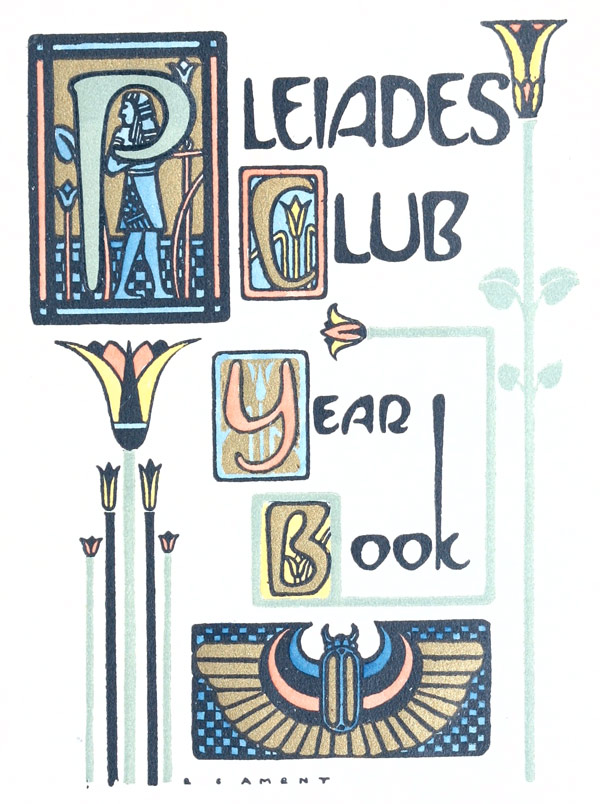
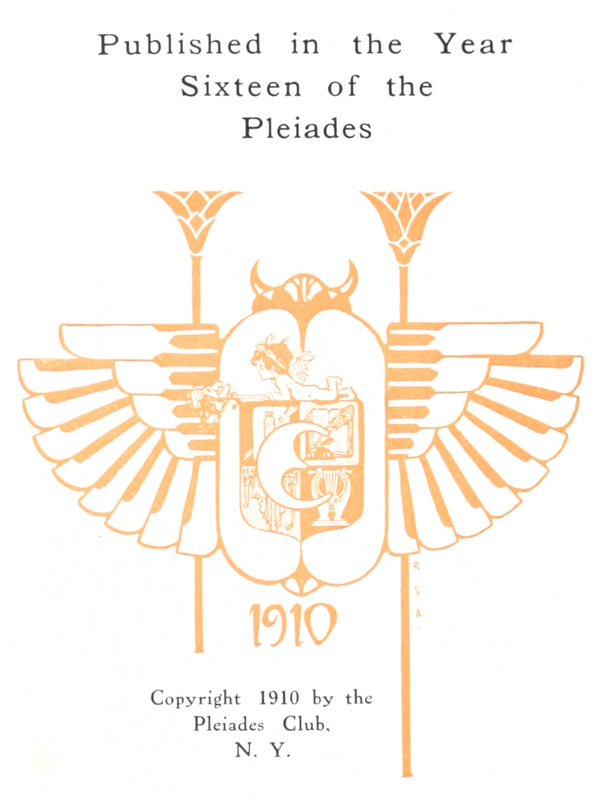
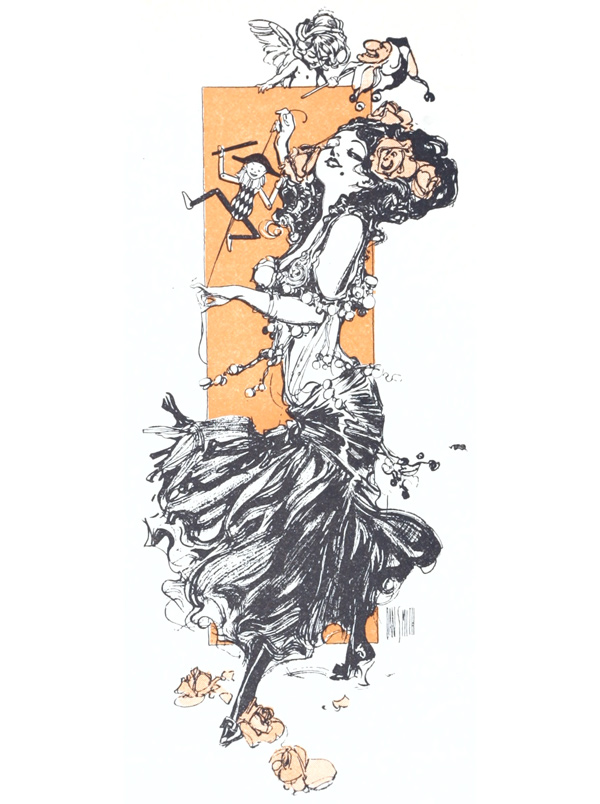

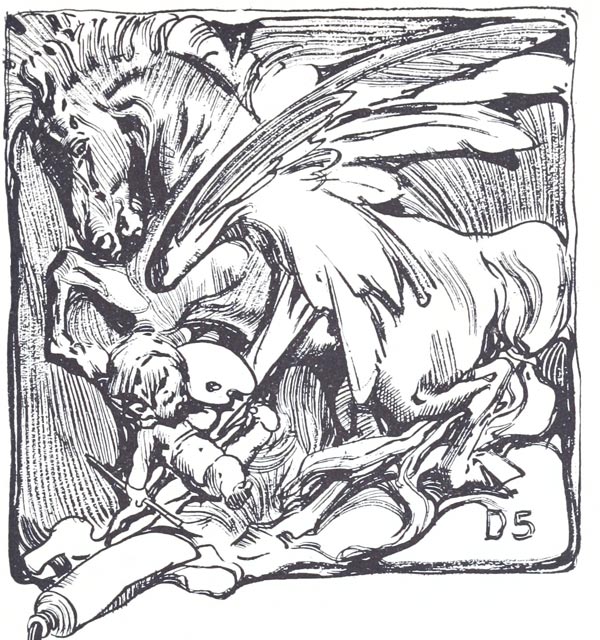
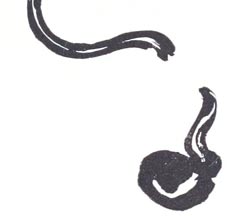
“A criticism of life,” says Matthew Arnold.
“The rhythmic creation of beauty,” says Edgar Allan Poe—defining the art of lyric poetry.
“The end of art,” says Victor Cousin (combining Plato and Aristotle), “is the expression of moral beauty by the assistance of physical beauty.”
But apply these and other bromidic definitions to the art and literature of to-day—measure them up against the Sunday newspaper, or “Peter Pan” at the theatre, or picture exhibitions of the Independent Artists and the followers of Matisse—and assuredly there is something wrong, either with the definitions or with the art.
Then turn to Emile Zola, and take from him this following dictum, which comes very close to being invulnerable:
“A work of art is a bit of nature seen through a temperament.”
This takes in all the schools, as well as the fiery, untamed spirits who would break away from schools altogether. Art is always the same; temperaments differ and become warped. The academician’s temperamental glass is ruled off into formal geometrical patterns, and he sees nature as a kind of problem in perspective. The rabid “impressionist” looks within himself, and away from nature, and “sees things” which don’t exist for anyone else. The true artist gazes straight out upon nature, and forgets himself, and art comes to him “as easily as lying.”
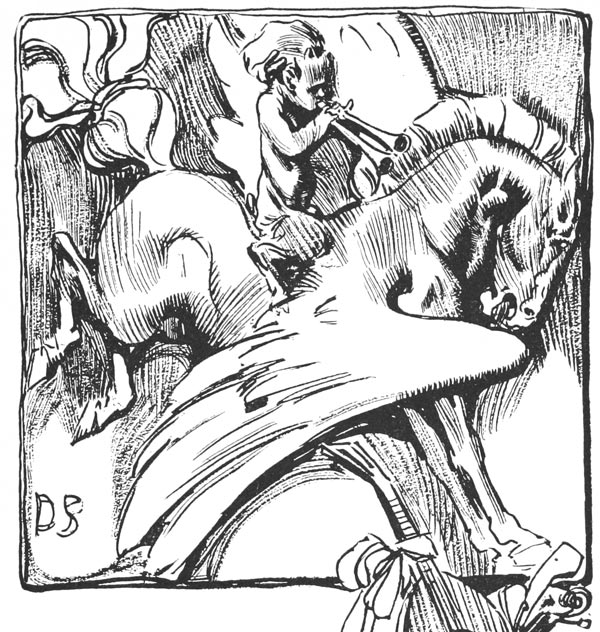
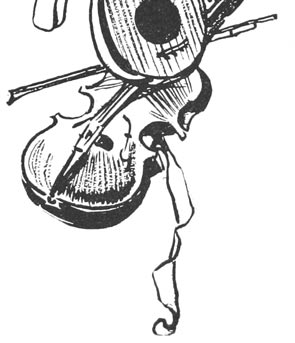
“Music is a woman,” said Richard Wagner. We may well go further and say: Music is a mother. It is by no mere chance that the Germans speak of Frau Musica. The devotion of Music to humanity, in its varying, growing and innumerable needs, is the eternal and utter devotion of a mother to her child. Music is ever present, ever watchful, ready to sing to man, whatsoever his need, whether of consolation, of courage, or of love. Nor does she forsake him in his evil hour, when none but darker passions can touch his heart. She will go with her children to the deepest depths, and if thus terrible has become their need, she will yield to them her heartbroken sympathy even in their hate and their lust.
Music will make all sacrifice for men. At the cost of fearful pains of growth, she will change her nature with their growing, or even their perverse needs. Let her living sons but call upon her to forsake her earlier nature to sympathize with the broader and deeper consciousness which they have wrung from life in their battle with circumstance, and unhesitatingly she responds. She will indulge a prodigal Strauss or a Debussy, even to his own harm, and she yields her best only to him whose sympathy has made him one with the deep and simple heart of humanity.
In America’s present need of songs breathing the freedom and courage of the New World, Music, the all-mother, is present and watchful, and will stand by her latest son until he is full grown and strong.
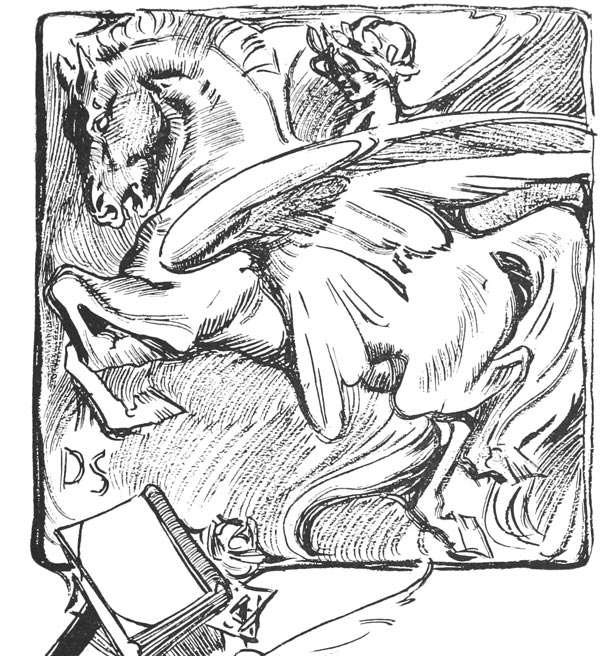
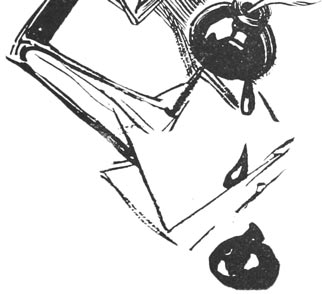
If it were proposed to give, in a brief statement on this subject, even a succinct account of the whole field, or the simplest sort of scientific review, there would be little room for anything else to appear in this volume. In fact, one deservedly famous frankly avowed that he would not attempt to say anything on the subject unless he had given the matter at least a month’s careful consideration, and yet it is much more than likely that the clientele for whom this particular book is especially designed would not take the trouble to read an article that had been prepared after such prolonged and ponderous thought.
The one thing that has characterized all literature, even before the art of printing was known, no matter what may be the definition of the word, is this: Whatever has pith, human interest, originality and action, however slowly it may have worried its way through the tired or befuddled brain of those persons whose privilege it is to see the matter before publication, will be quick to catch the eye of an ever alert public.
This is as true of science as of fiction: as universal in poetry as in prose. A single illustration will suffice: Quite recently a book, in many ways abstruse, appealing, apparently, to a limited class of readers, had just that touch of tenderness, that trail of truth, that caused a tremendous sale, and exhausted the edition in a remarkably short time.
It was once asked what part of a newspaper was most interesting; the answer from many readers and from many lands was practically the same: it depends entirely upon who does the reading. This is quite as true of literature in general as of one part. When we reflect for an instant we must acknowledge that in every thinker’s life there are periods that differ materially in the attitude towards reading; that some special line is apt to predominate, even in one who is known to be a general reader: it may vary with time, place, conditions—in fact, under almost all conceivable circumstances—but there is never a time when there are not more readers in any line than there are books worth while to meet their needs, or to satisfy their demands; in short, it is just as true to-day as before or since the thought was expressed in words—Brains are always at a premium.
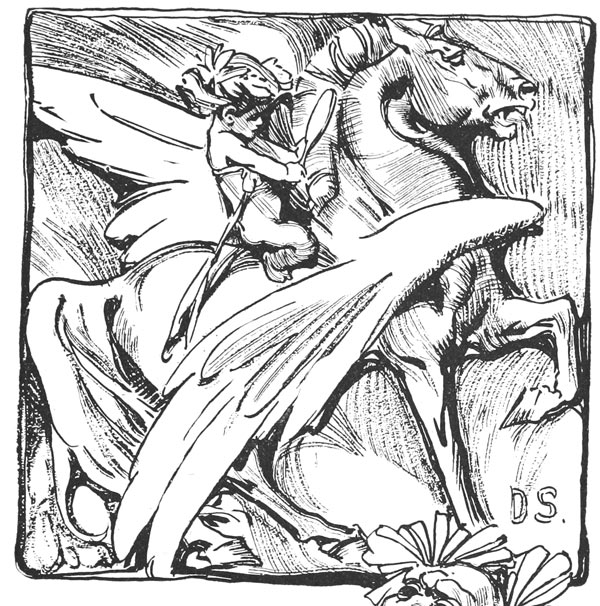

The profession of the player is one of the oldest recognized and in its growth and achievement stands foremost of all the arts.
In its crudest form little is known, but as a profession it may properly date from the Chinese and Grecian periods, when players were chosen from among the infant slaves and trained to the art by masters, not unlike the painter and the bard.
To the immortal genius of Shakespeare does the world owe its inexpressible appreciation of the artistic development, realizing to the fullest degree the possibilities, and subsequently the mastery, of the art, placing it at once on the highest pinnacle of achievement and according to it the laurel of universal popularity.
To this genius is added that of others, each attaining a greater degree of appreciation, until to-day the art of the player encompasses the highest attributes of the allied arts.
The player is one who loves, and understands, nature. To do so he must feel, in the highest sense, the emotions of the artist, the poet and kindred spirits, because from each he must cull the choicest petals—the inspiration of the poet, that he may portray the character; the genius of the artist, that he may imbue it with life, and the passion of the bard, and to this the sympathy of a Madonna, the tenderness of an angel, the love of a mother and the strength of a giant.
The development of the art of the player records the development of civilization itself. The player and his art obtains wherever there is civilization. In its highest form it is at once Literature, Art and Music in harmonious arrangement. In its possibilities it is Religion, teaching the whole world by its power:
The player, supreme in his art, is master of every emotion.
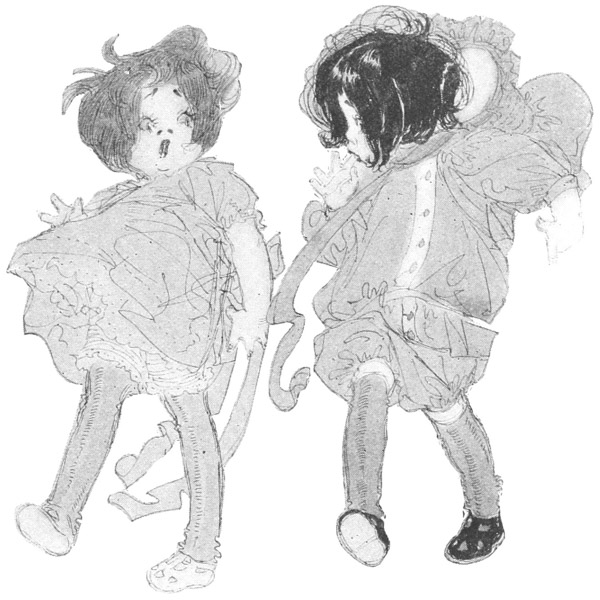

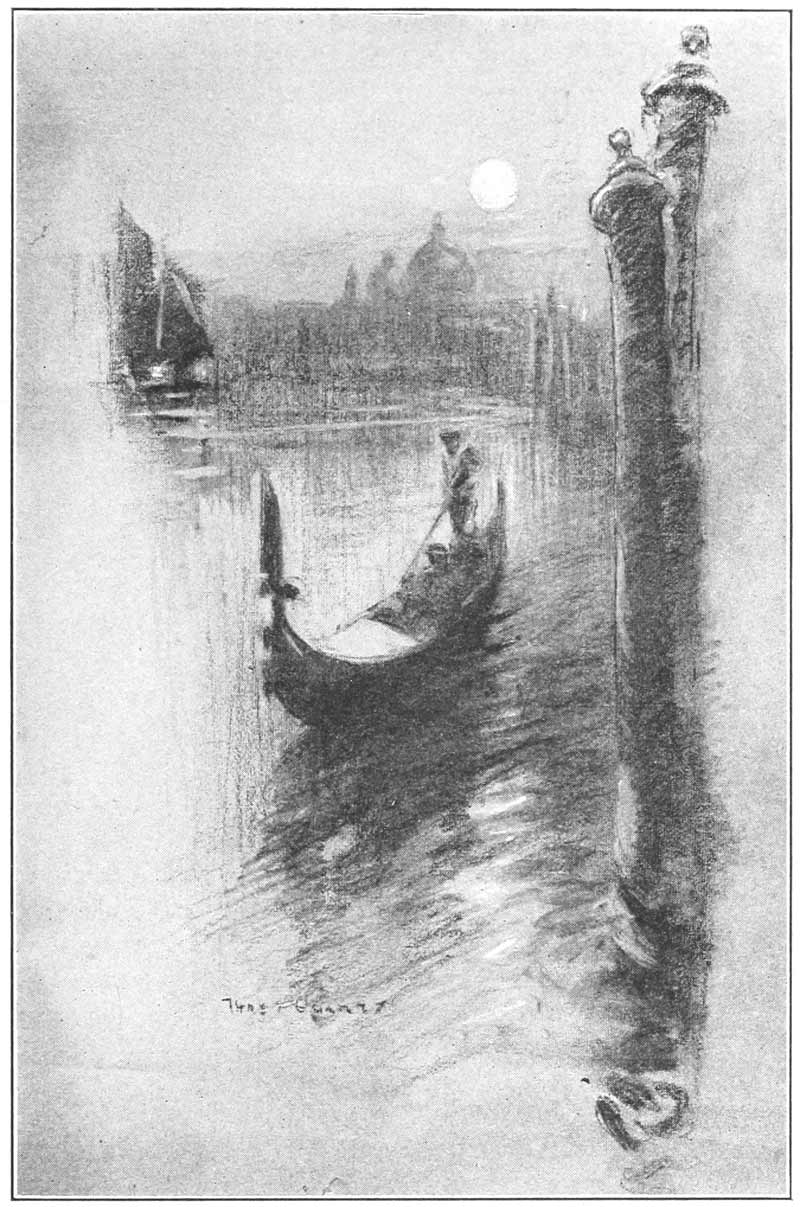
 EAUTY
is only paint-deep at times.
EAUTY
is only paint-deep at times.
Only the brave can handle the fair.
A pretty girl envies but one girl—a prettier one.
Many a poor husband is created from a rich man.
While there is an engagement there’s hope—of liberty.
Men can persuade a woman to do anything she wants to.
Men can be classified; women cannot even be pacified.
A woman’s idea of happiness is to be ideally miserable.
A woman will break a heart as readily as she will crack a smile.
No married man ever was a fool without being told of the fact.
The grass widow is not alone in making hay while the sun shines.
A bachelor is a man who has given serious thought to matrimony.
Bachelors form their opinion of marriage by experience—of others.
There is nothing new under the sun except hat styles for women.
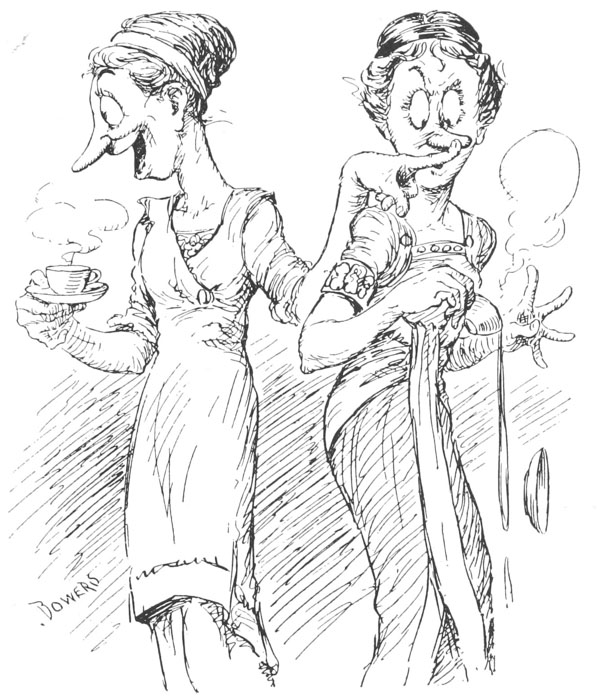
“A woman imagines she can cover up her imperfections by pointing out those of other women.”
Every girl would love to be a thing of beauty and a boy forever.
When a woman proves equal to all a man expects she is a sur-prize.
It isn’t nearly so hard to be a fool over a widow as not to be one.
Every woman secretly admires the wisdom of the man who flatters her.
A woman may conceal her faults, but a decollete gown is less deceptive.
The blush of a bashful girl is a flush that takes any hand—and heart.
“The cup of happiness” with men of experience has a siphon on the side.
Every woman has a horror of old age, but not so much as of young death.
Women are never satisfied. First they want a voter and then they want a vote.
Some men are born to trouble, while others merely achieve it by marriage.
There is but one kind of love, yet every woman has a different idea about it.
Men, manners and morals change, but woman, never—from the changeable.
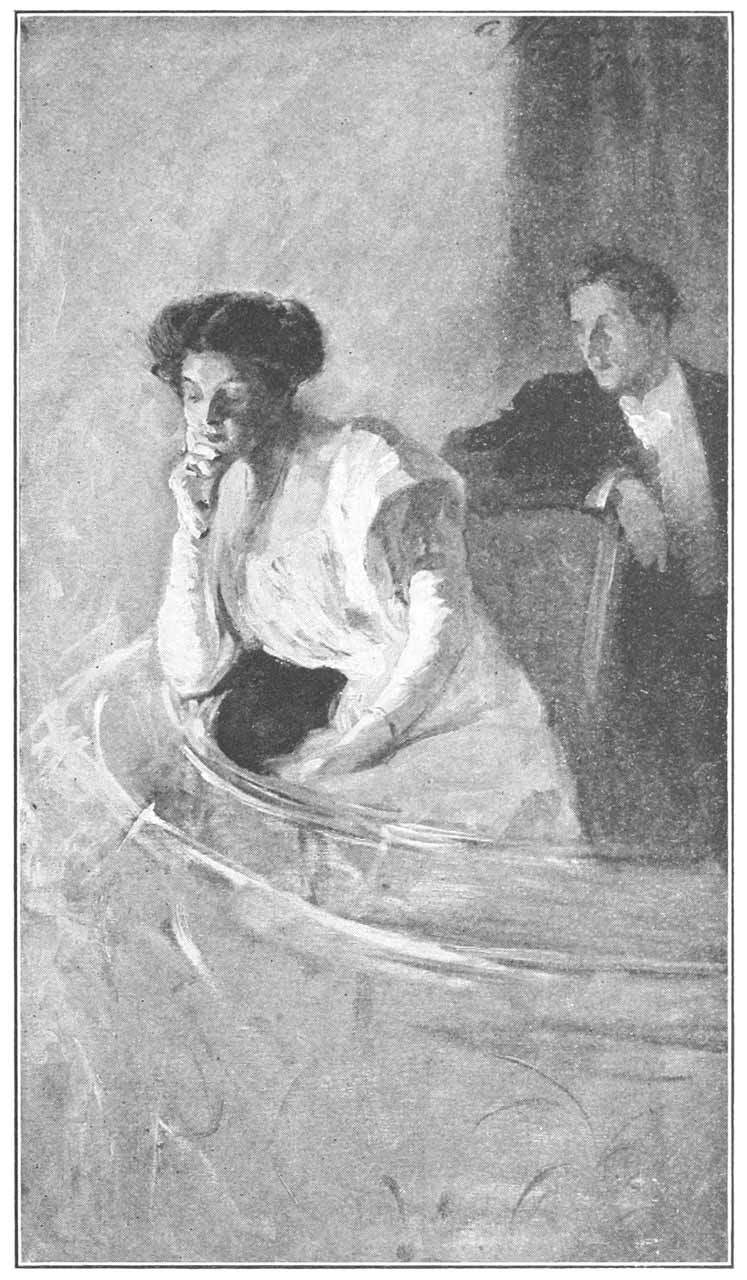
A man may be “out front” at the opera and yet be able only to “see back”—if he is with her.
Every woman expects a man to think for her, and then she reverses his opinion.
When it comes to singing the praises of another, most women have a sore throat.
Man’s principal safeguard against matrimony is that widows are made, not born.
Many a promising housekeeping career has been ruined in an unpromising stage career.
Men have found many antidotes for a woman, but the surest of all is another woman.
A woman spends one-half of her time telling lies for men and the other half to them.
Women often know a man is in love with them when the man never discovers the fact.
Men often find it necessary to choose between the inconstant and the unattractive woman.
A woman keeps a man running all the time—first it is after her and then it is from her.
If women did not know that men could overcome their resistance they would seldom resist.
There are two ways in which a woman may win a man: Her own brilliancy and his inanity.
When a man is at the feet of woman it is pretty sure that another woman threw him there.
Every woman wants a man to be real devilish before marriage and real angelic afterwards.
Anyhow, there was one woman who was never jealous. Adam didn’t have troubles about that.
A woman imagines she can cover up her imperfections by pointing out those of other women.
Some men are born wise, some achieve wisdom by experience, and some just don’t marry.
Two kinds of women make trouble in the world—those that are married and those that are not.
There is but one class of women who are not interested in the fashions and they are the dead ones.
The philosopher said a woman could not argue—he was too wise to say that she could not talk.
The reason so many men find marriage unattractive is because life was so attractive before marriage.
It isn’t a hard matter for a woman to make a man love her. The difficulty is in making him keep it up.
A woman can make up two things at the same time—her face and her mind; but her face lasts longer.
The world has no sympathy to waste on those reckless enough to wed when both have been married before.
If a man does not tell a woman he loves her she thinks him impossible; if he does, he knows himself foolish.
When a woman says that all she wants is what she deserves she really means she deserves all she wants.
When a girl reaches that uncertain age and is yet unmarried, she is often worse than she paints herself.
Sometimes there is more truth than sentiment when a man tells a woman a thing is as plain as the nose on her face.
No one has ever yet discovered why a woman is afraid of a mouse and tackles a six-foot man with confidence.
A woman will start a flirtation in fun and then wonder why a man won’t follow her when she gets serious.
If a man wants to make a fool of himself he can find many opportunities, but the surest way is over a woman.
Men and women both agree that it is inadvisable to live without each other and impossible to live with each other.
Whether a married man pities or envies his bachelor friends depends entirely upon how long he has been married.
If a man really wants to start something with himself, let him try to love a woman just as a woman wants to be loved.
The best way to find out what a girl who is in love with a man thinks of woman suffrage is to find out what he thinks.
A man may escape the measles, or automobiles, or even being indicted, but no man has ever been known to escape a widow.
No woman ever told a man she hated him without meaning it; some women have told men they loved them and meant it.
Rather than a man should be right and belong to another woman, a woman would have him wrong and belong to her.
The reason widows are so attractive to men is because they will allow themselves to be taught things they already know too well.
A girl will gaze for three hours and a half at the moon and then wonder why she hasn’t time to sew a button on her brother’s vest.
The happiest man is he who will take a woman’s protestations like he does a dose of medicine—with celestial faith in the giver.
When a woman fails to see an opportunity to be generous to another woman it is not necessarily a sign of defective eye-sight.
Don’t misunderstand a man when he tells a woman she is sweet enough to eat—maybe he is thinking of the forthcoming restaurant-check.
Between the ages of sixteen and thirty a woman is a general practitioner in the field of love; after that she is satisfied to become a specialist.
A man is willing to worship at the shrine of a woman with whom he is in love until he meets another woman—then he changes his religion.
The question will never be settled between women as to which will win a man quicker, a pair of silk stockings or an ability to bake a good cake.
If ever the fact that there are no marriages in Heaven is generally believed by women, half of the preachers will be obliged to seek other employment.
If a woman were obliged to express a preference, she would choose the man who pleases but does not love, to the man who loves but does not please, her.
Women are said to be more “clean-minded” than men. Men might meet feminine competition if they resorted to the stratagem of changing their minds as often.
The greatest disappointment after marriage comes to a man when he realizes that his wife does not look like the models in the shop windows during a white-goods sale.
A man can protect himself from the things said about him by the women who don’t love him. It’s the things said about him by the woman who does love him that keep him worried.
Women, says a sage, are like books: No man can judge the inside by what is displayed on the outside. It is a poor rule that won’t work both ways. Women are unlike books: When one has finished with a book it can be closed up.
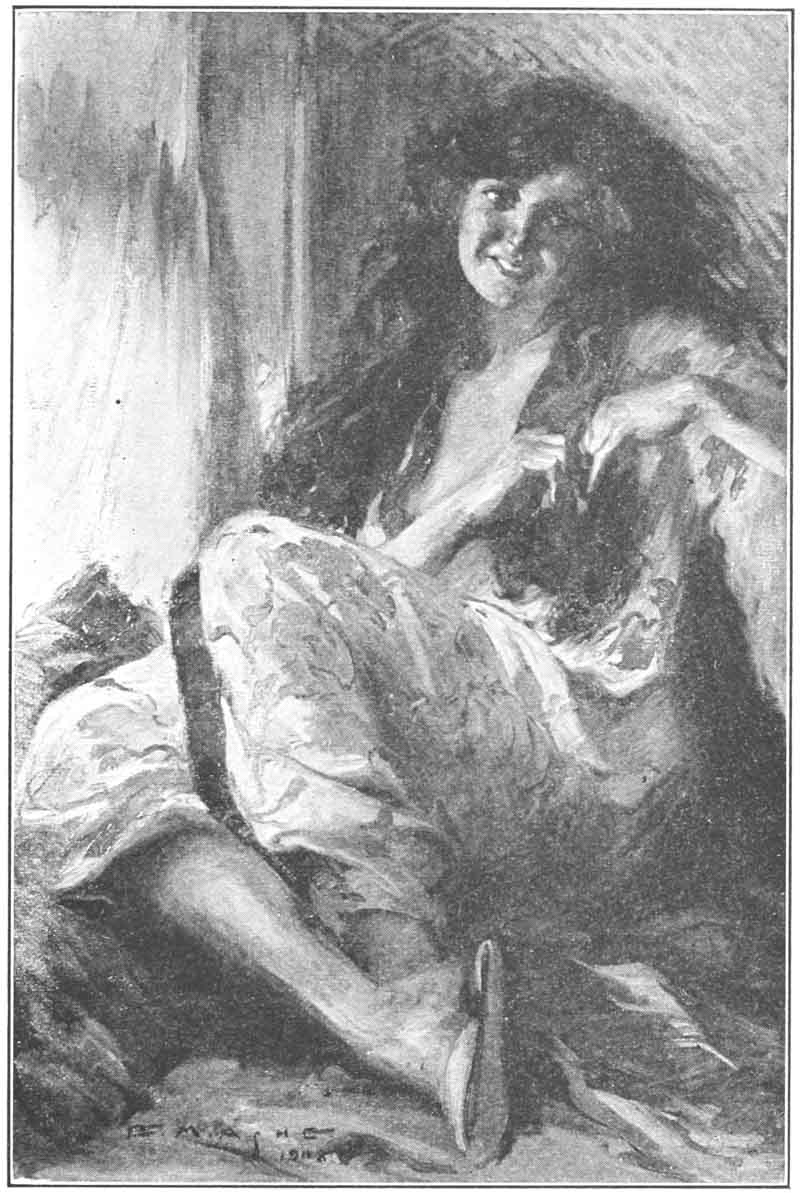
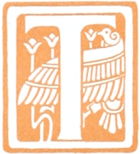
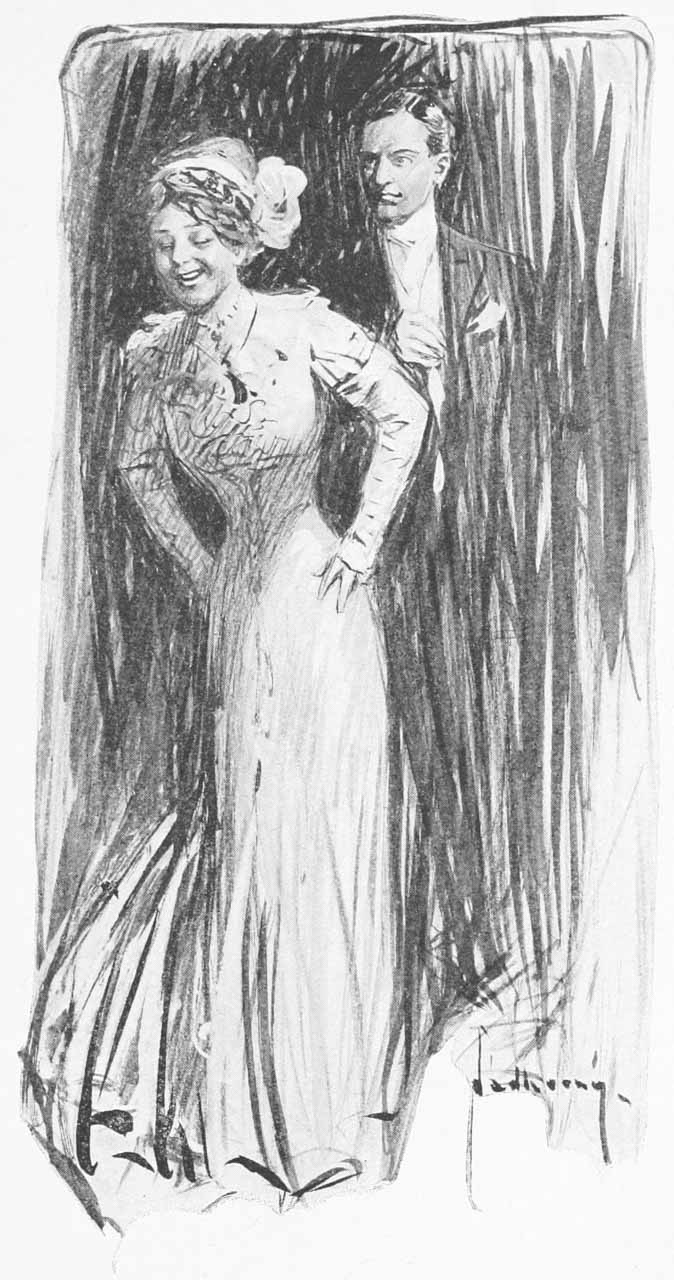

 |
A shot rings out in the forest’s side;
Its signal of death strikes the Moose King’s heart,
And the Indian hunter views with pride
How his skill as a huntsman has won its part.
But the Shadow that falls
on the ground below Foretells the time
when he, too, shall go. |
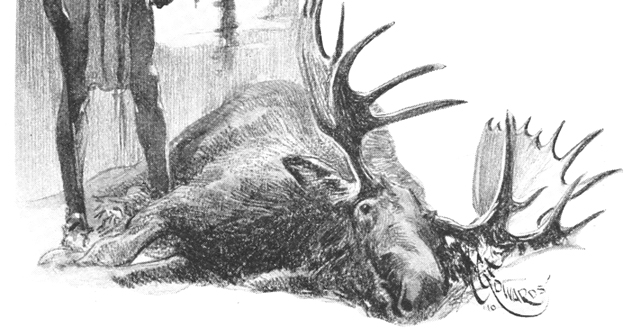 | |


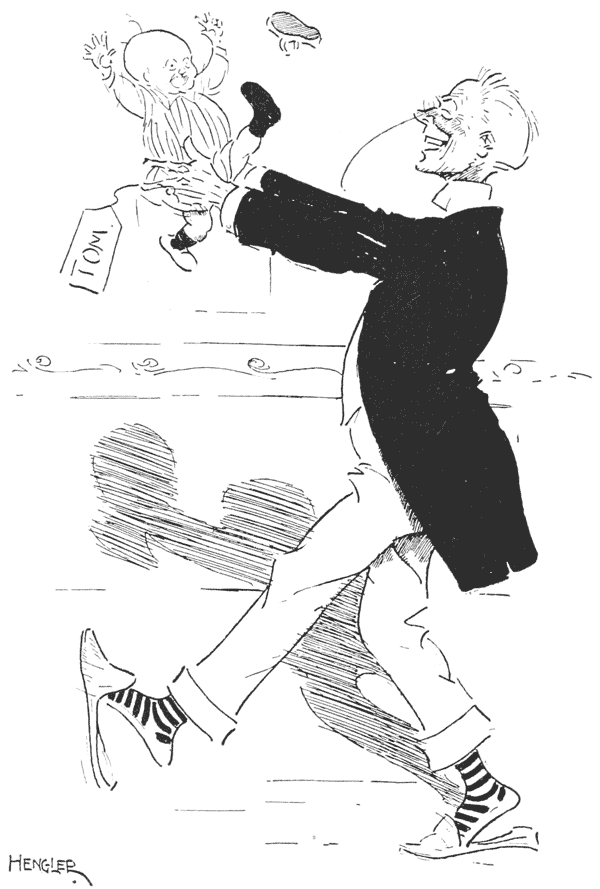
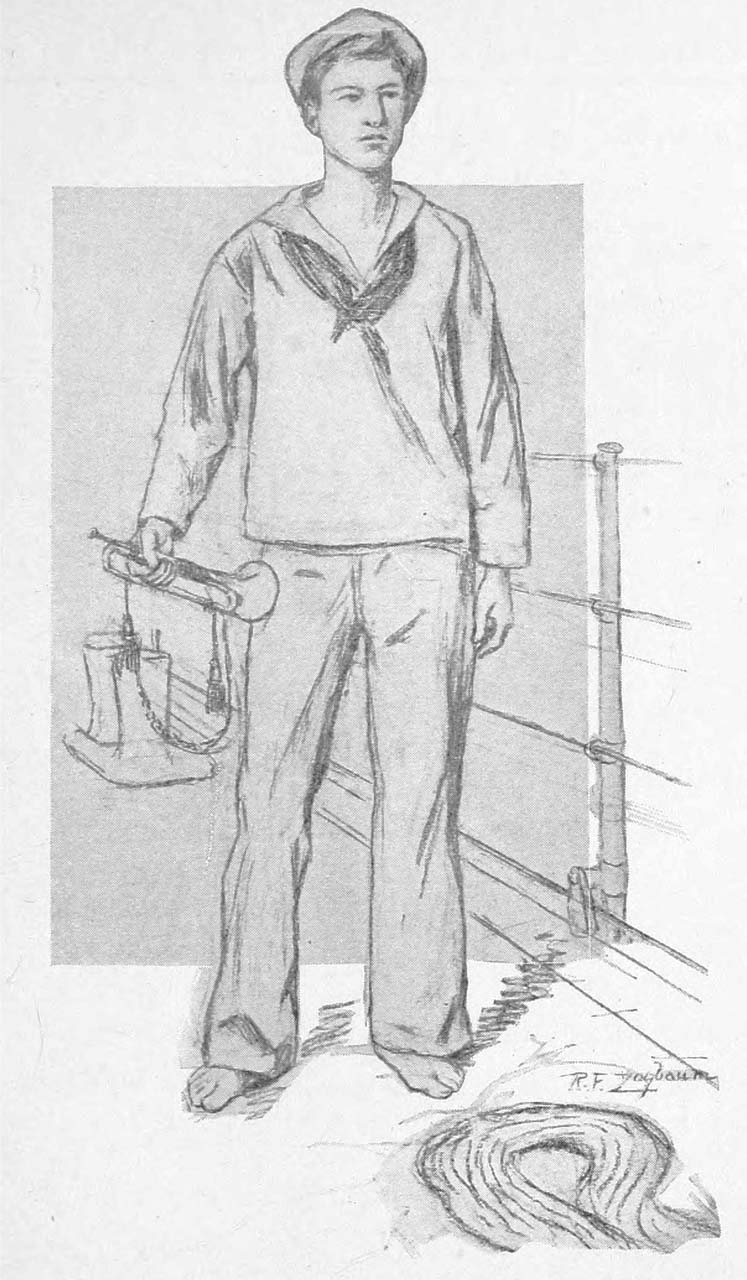
Drawn by R. F. Zogbaum.
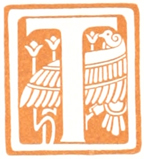

 APA
can stand no more! How, then, can I break this to him?” The
speaker, a radiantly beautiful young girl, stood sobbing in the
great musical emporium of Harry M. Daly & Co.
APA
can stand no more! How, then, can I break this to him?” The
speaker, a radiantly beautiful young girl, stood sobbing in the
great musical emporium of Harry M. Daly & Co.
“Consider me a policeman and not a piano-mover.” As he said these words, Paul Postelwaite came forward with his hat in his hand. For all he knew the damsel in distress might be a carriage customer, and, besides, he was afraid if he left his hat in the shipping department a member of the firm might steal it.
“Oh, sir,” replied the beautiful young girl, “I saw a pianola advertisement some time ago which said: ‘With this instrument anyone can play the piano.’ And I, taking all my little savings, bought one for papa!”
“Yes?”
“It arrived to-day. Too late, I perceive that a pianola is an instrument from which music can only be extorted by the feet, and poor papa was run over by an electric car and lost both legs.
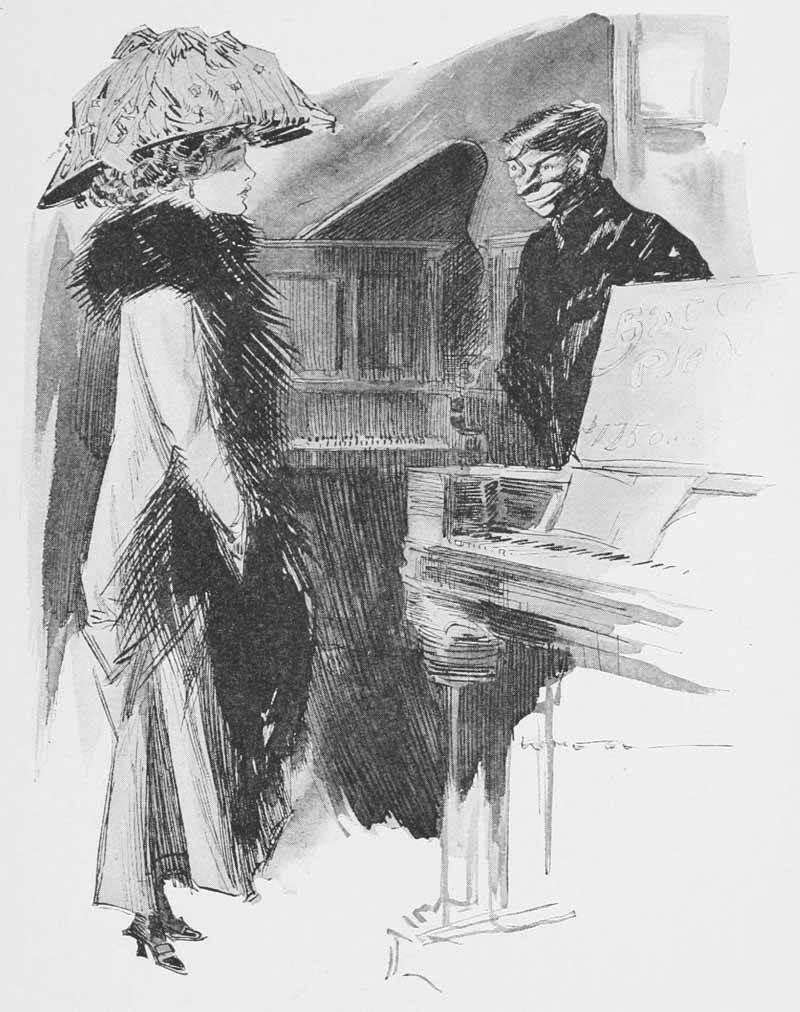
“It was all my little savings, as I have said. The firm will not take the pianola back, and my poor papa has no visible means of support.”
“But you can sue the street railway company for damages,” said Paul, soothingly.
“We threatened to do that, but the railroad company only said papa should consider he was sufficiently damaged and they did not see why he should sue for any more. However, they said we might bring the matter into court and they would see what they could do to his character.”
“Go home, little one,” said Paul Postelwaite, kindly, “and I will come around this evening and play the pianola for your papa myself.”
The foregoing will show that although Paul moved in musical circles he was neither a sharp nor a flat. His worst predilection was that he continually talked shop, for his last words to his distressed young confidant were, “Compose yourself!”
Paul Postelwaite had long resolved upon a musical career. He knew the pitfalls of the profession. On every side of him he saw and heard the unfortunates who played the piano to excess. A hater of discord, he resolved to save the victims of piano-playing from themselves. To this end he studied piano-moving.
Most pianos are bought on the instalment plan. Most payers for pianos bought on this plan fall behind in their instalments. It was Paul’s duty to call and take away the pianos of those who had been remiss.
He bore abuse and vituperation, not with stolid indifference but with the conscientious feeling that he was a public benefactor.
He had the reward of public appreciation. People afflicted by proximity to those who played the piano to excess no longer complained to the Board of Health. They ascertained if any payments were overdue on the instrument of torture, and then they sent for Paul.
Paul’s father had been a piano-maker. But he had been overtaken by misfortune. He made pianos for the big department stores.
But while he only made one grade of piano, he was compelled by the exigencies of his trade to stencil them with so many different names that he forgot his own. And one day, while suffering from loss of memory in this regard, he signed a name not his own to a check and was compelled to retire from business to Ossining-on-Hudson.
His father’s parting advice had been, “Never forget who you are, my boy!”
That evening, carrying with him a pair of wooden legs, as a pleasant surprise for the abbreviated parent, Paul called at the cosy Harlem apartment where dwelt the young girl who had so attracted his attention that morning.
As the young girl opened the door for him with a glad cry, Paul proffered the wooden legs. “These are for your father,” he said; “he has a heart of oak, I know, and now he will have legs to match.”
“Bless you, young sir,” cried the father of the girl. “This will place me on a better footing with the world! And should I die they will be a legacy for both of you. And now, thank gracious! I can play the pianola!”
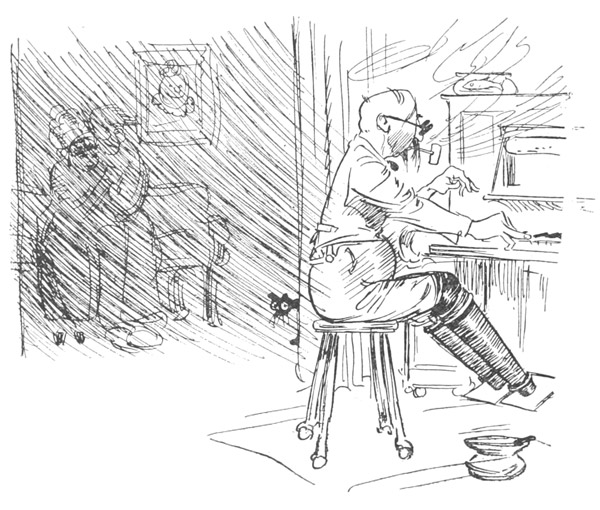
“The grateful father adjusted the artificial limbs and was soon playing Handel with his feet.”
So saying the grateful father adjusted the artificial limbs and was soon playing Handel with his feet, extracting from the music chords of wood, as it were, of a timbre most surprising.
This was not all. Paul secured the old man a political position as a stump speaker, at which he was doubly successful, and how he stood on public questions is well known; his physical disability, of course, stood in the way of his ever running for office.
As for the daughter, Paul married her. There is no need to tell you her name. She is Mrs. Postelwaite now and that is enough.
They are still a musical family, and the pride of their home is a Baby Grand.
For Success—initiative, concentration and perseverance;
For Happiness—love, cheerfulness and a sense of humor;
For Good-fellowship—the Pleiades.

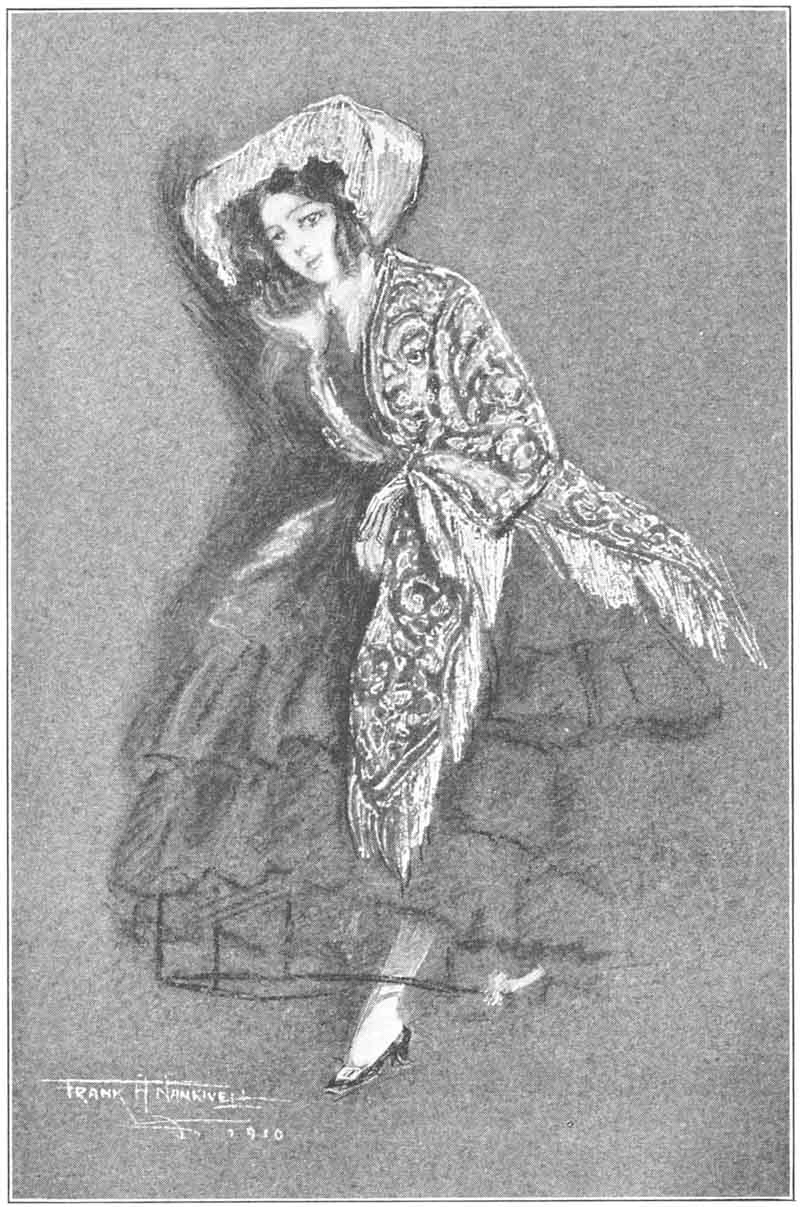
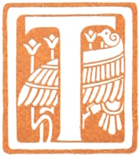


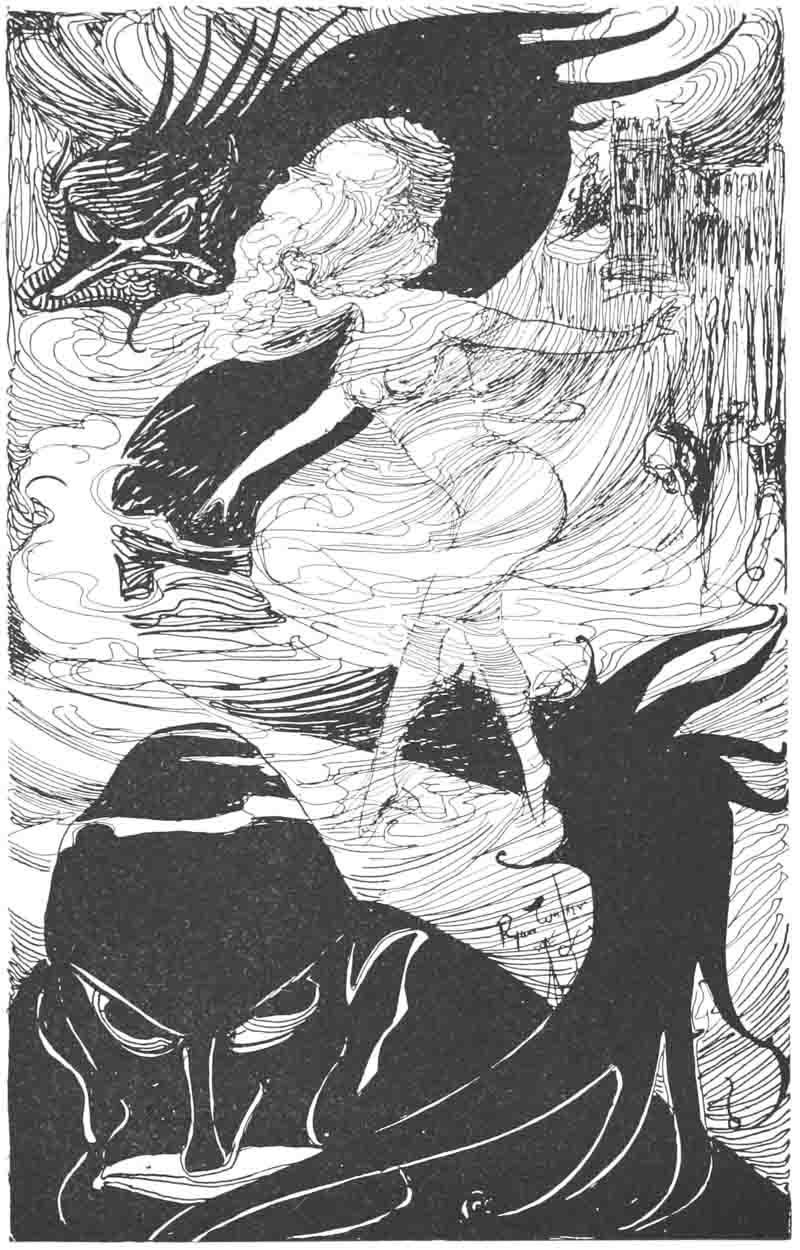

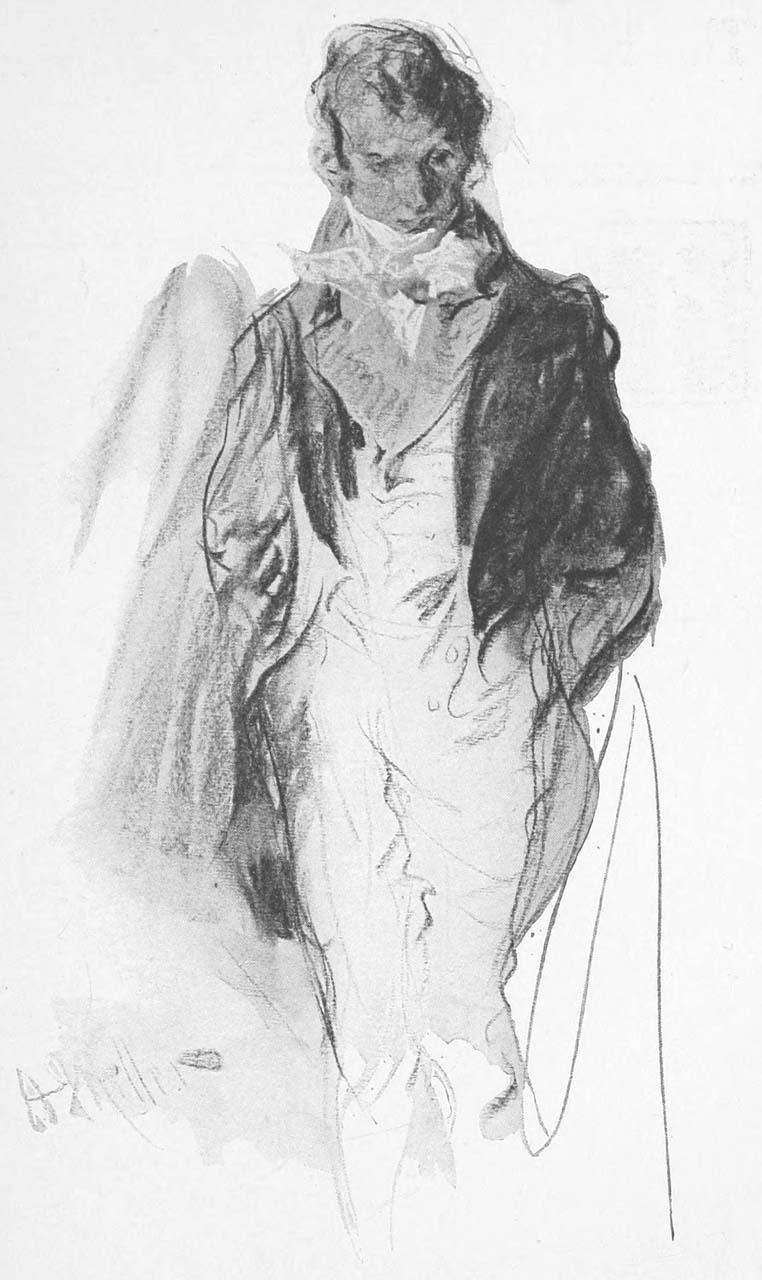
 HERE
was once a Sagacious Youth, with a High Brow, who Opined that the
World owed him a Living.
HERE
was once a Sagacious Youth, with a High Brow, who Opined that the
World owed him a Living.
“It is all very well,” he reflected, “for Ordinary Dubs who have not been blessed with a Superabundance of Gray Matter as I have, to Strain on the Collar in the Tread Mill of Business, but the very thought of Work makes me Tired, and I apprehend that there are Easier ways of getting the Pelf than by Earning it.
“It is, of course, a Good Thing that not every one is as Brilliant as I am, for if they were the world would blow up with Spontaneous Combustion. It really pains me to see others toiling along day after day for Measly Salaries, when they might have money coming to them on Wings if they only used their Wits instead of their Paws.”
With that the Sagacious Youth worked out a system that was a Sure Thing on paper for Divorcing the Public from its Long Green.
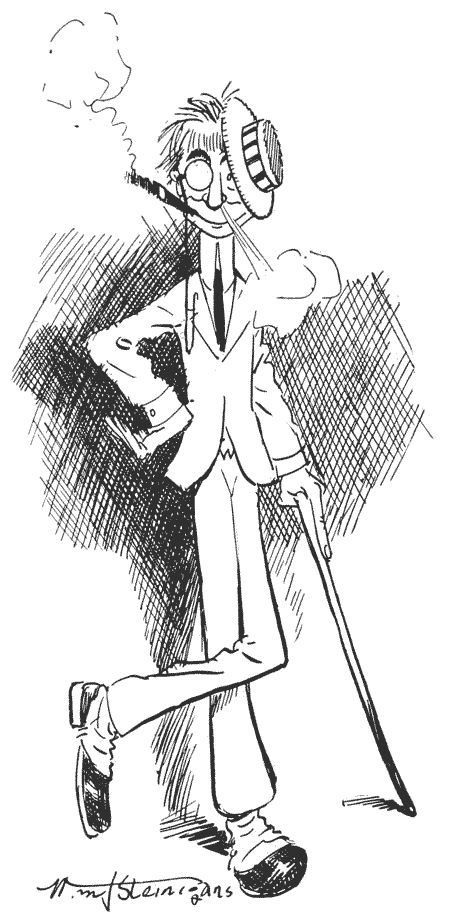
“I learned from the Census Report,” he said to himself, “that every Minute a Sucker is Born, and I apprehend that they are Providentially provided to furnish Automobiles and Wealth Water for Wise Guys like Me, and that all that I shall have to do is to take advantage of their Gullibility in order to Hook Them and have a Fish Chowder that will be a Perpetual Picnic.
“I have perceived that most of my Fellow Creatures are so Greedy that they will swallow any sort of Bait if it looks Fat, and that if you only Promise them enough, it Razzle-dazzles them so they do not investigate your means of Making Good.”
Thereupon the Youth began burning the midnight Carbon concocting a Prospectus of Speculation made Easy, by which Widows and Orphans and Clergymen could be separated from their Pile and enjoy all the Excitement and Losses of Wall Street at Home.
As an idea it was a Jim Dandy that commanded the respect of the Financial World, but before the Youth could realize it the Post-Office Department got Wise, and he felt it best to Travel in Europe for his Health.
“Alas!” cried the Youth, “I fear that the Confidence Game is getting Over-Crowded, and it is evidently up to me to either Marry and give some Female the Pleasure of Supporting me, or else go to Work.
“Personally, my tastes are not Domestic, and I prefer Single Blessedness to Double Wretchedness, but it is clear that it will be less Fatiguing to hold a Lady’s Hand than to call Stations in the Subway; it’s me for the Altar. Besides, as soon as I have annexed little Tootsey-Wootsey for my own, I will take possession of her Bank Account and then all will be well.”
So the Youth espoused an Elderly Widow whose No. 1 husband had left her a Large and Juicy slice of Insurance, but contrary to his expectations she was a Foxy Lady with a Time Lock on her Pocketbook, and he could not work the Combination that opened it.
At this the Youth shed bitter Tears, but when he began knocking Fate his Friend called him down.
“It may be True,” said the Friend, “that the World owes you a living, but there are many Small Debts that we have to Personally Collect.
“If you had displayed as much Imagination in writing Fiction as you have in Telling Lies that deceive no one, you would have received an Honorary Degree from Yale instead of the Double Cross from your Fellow Creatures, and if you had worked as hard at some Honest Calling as you have in trying to Rob Others you would be a Millionaire instead of a Tramp. It is my observation that the Beater always gets Beaten in the end. Farewell!”
Moral: This Fable teaches that Most of the Short Cuts to Success end on the Dump.
Somewhere I have heard that the “Pleiades all sang together,” and I therefore submit these all-star verses as a song.

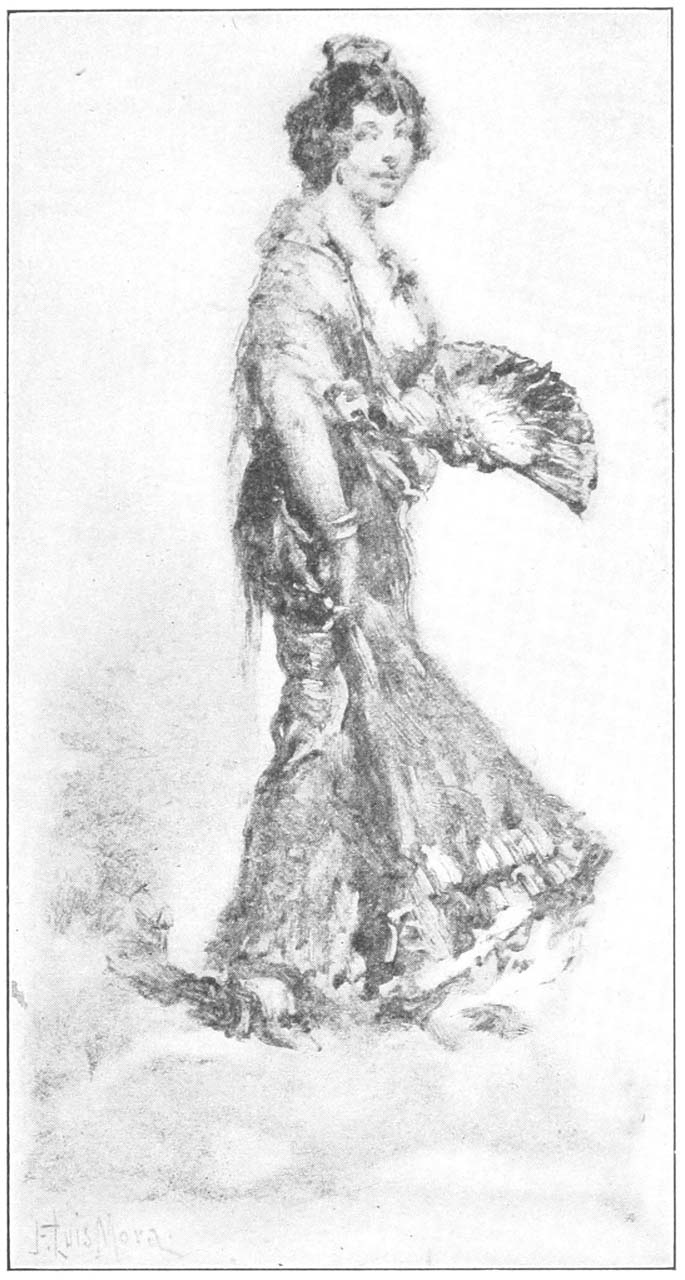
P. S.—There are said to be seven seas. It ought to be seventy.



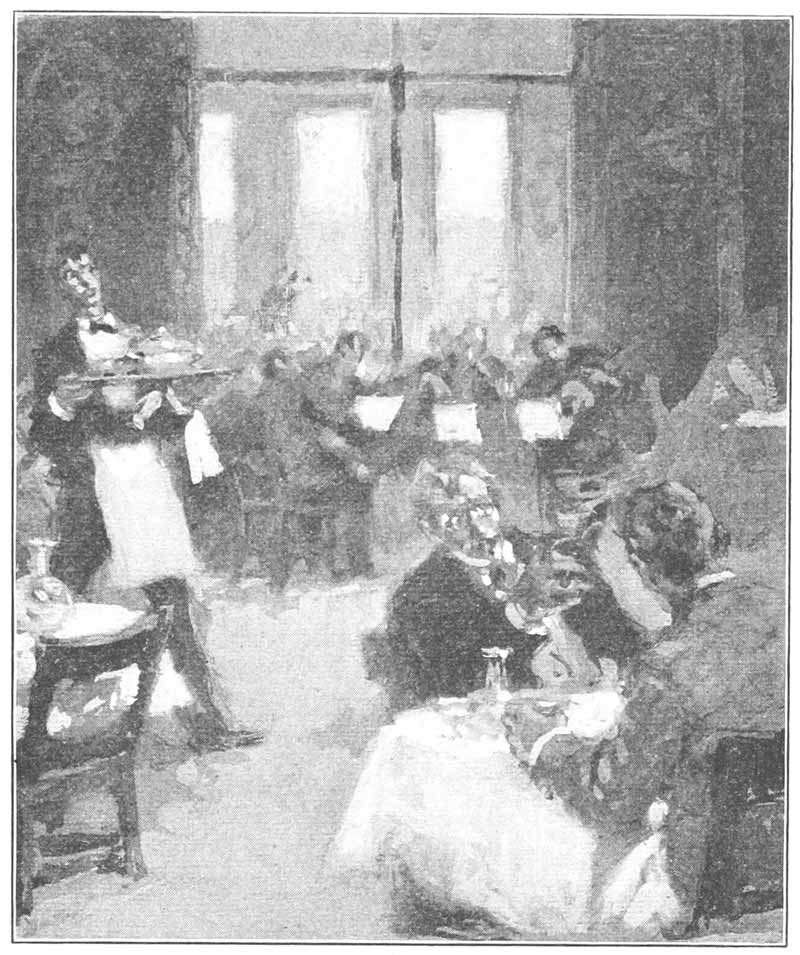

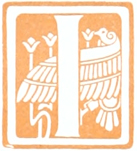
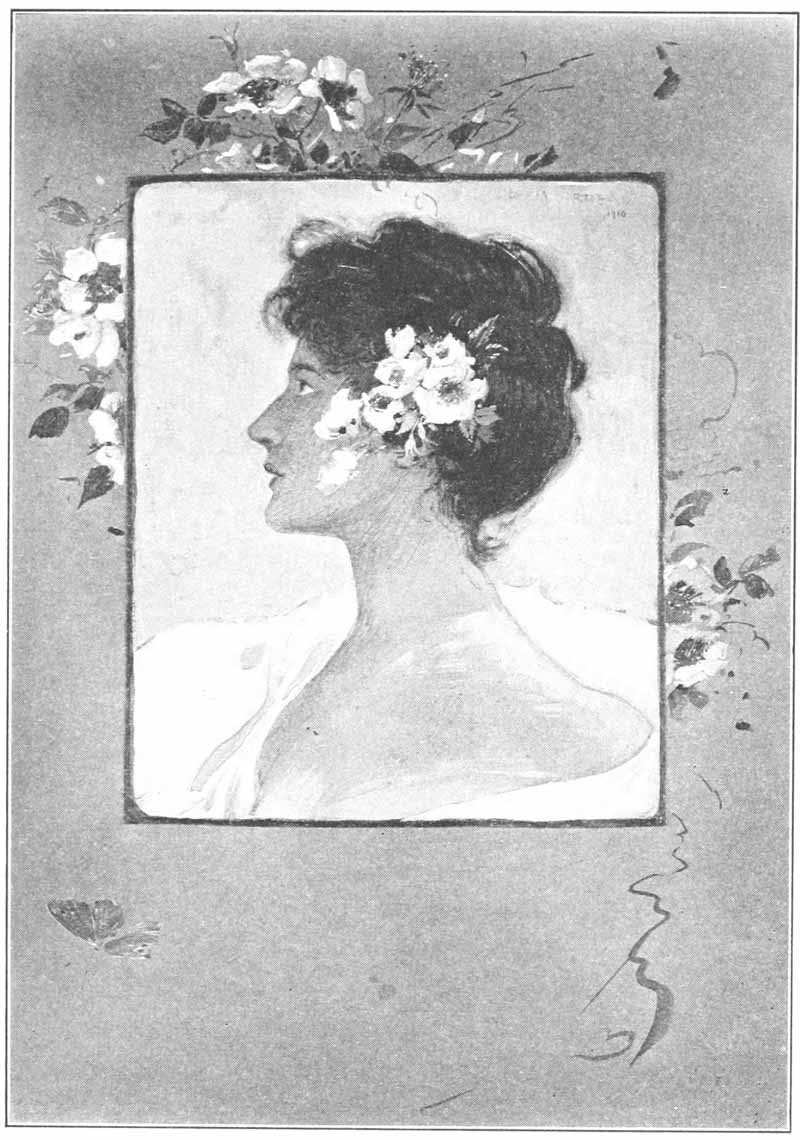


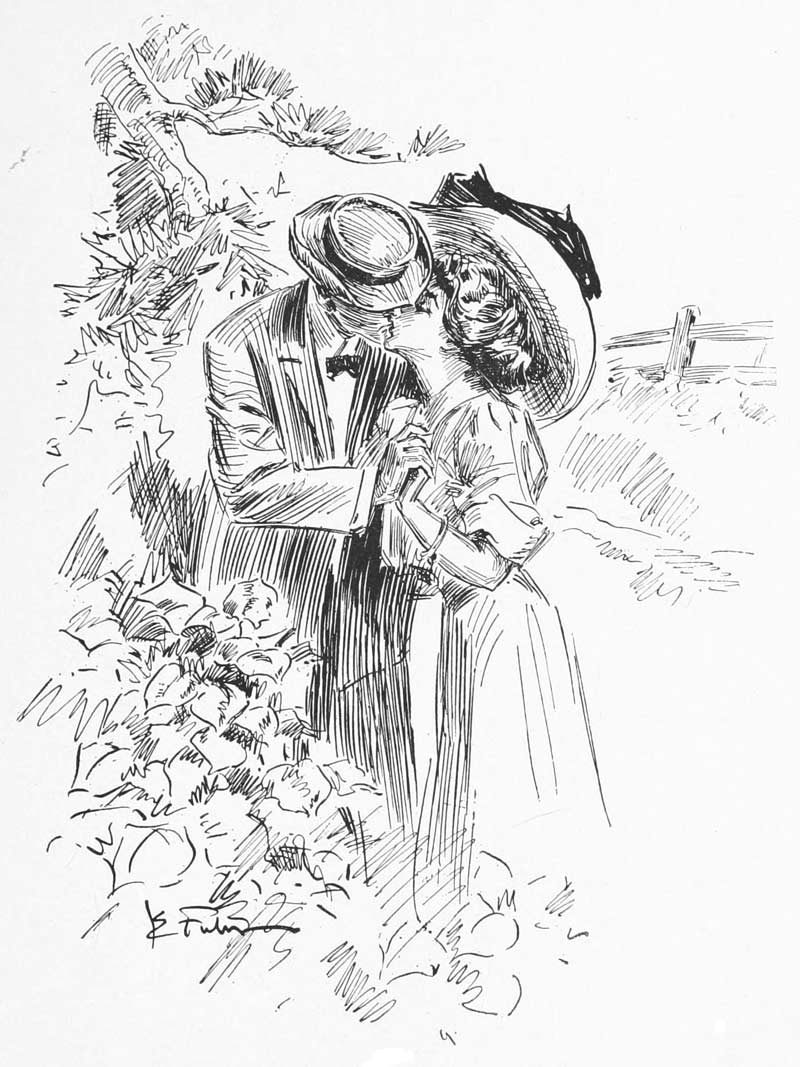

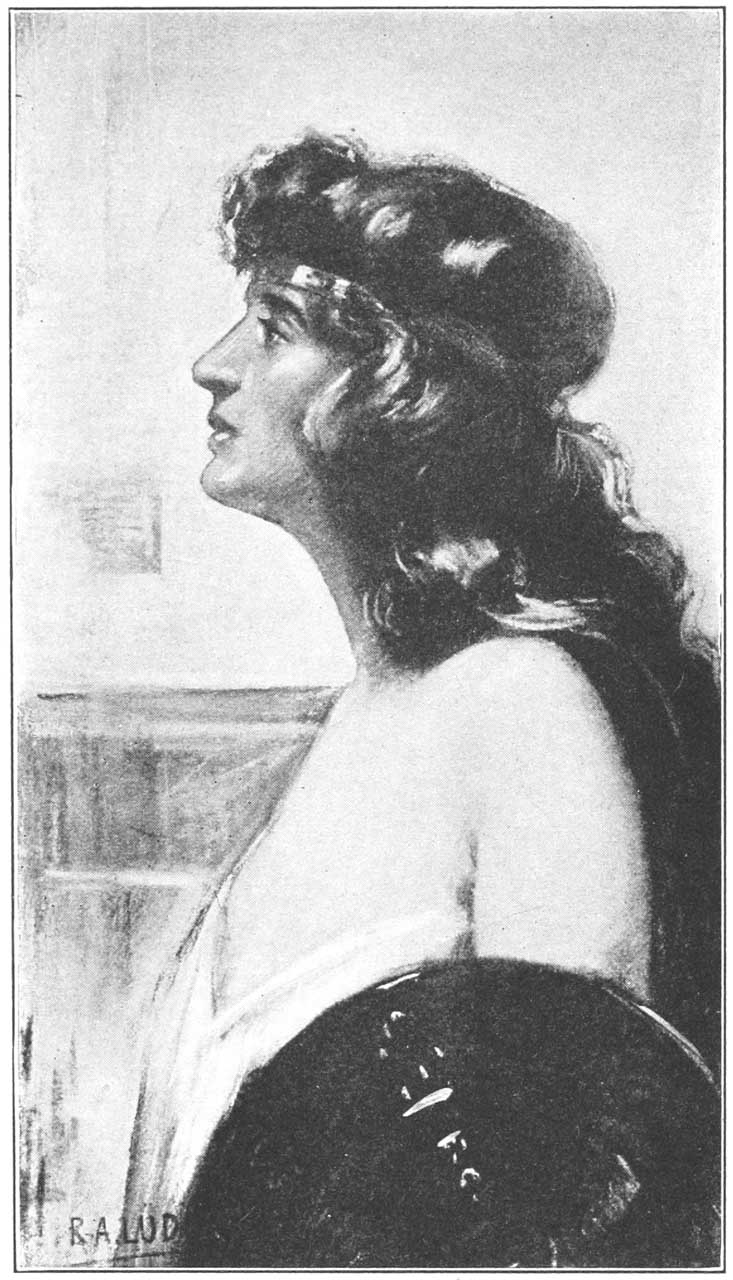
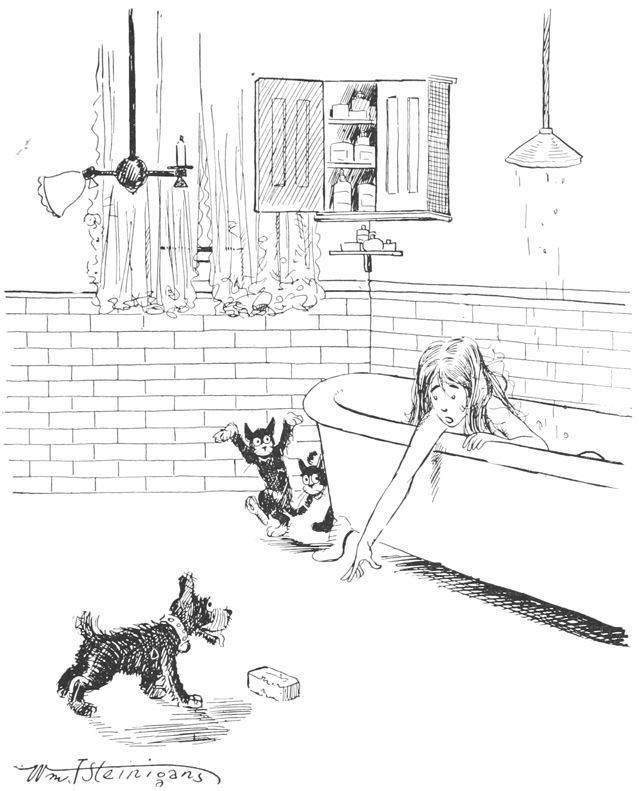
Drawn by Wm. J. Steinigans.
See the lady? Does the lady want the soap? The lady certainly does. Will the pup bring the soap to the lady? It will not—the pup is a gentleman pup and the lady is a suffragette. The pup wants her to get it herself.
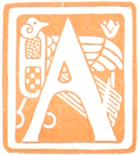
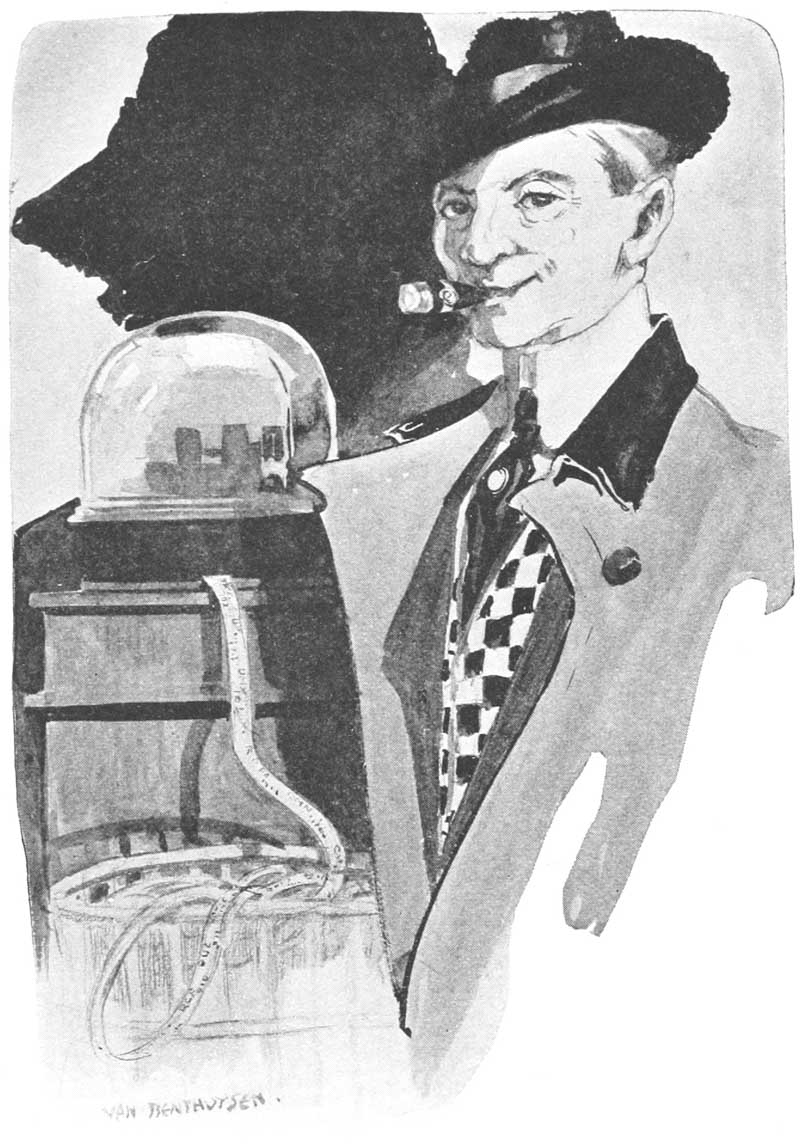
 OU—you
will come over Wednesday evening?”
She asked it hesitatingly, timidly
almost.
OU—you
will come over Wednesday evening?”
She asked it hesitatingly, timidly
almost.
“I’m afraid I can’t Wednesday,” as he picked up his hat and cane.
“Then Thursday—have you an engagement for Thursday?”
“Thursday is the dinner of the Civic Club.”
“Oh, yes; of course you must go to that.” There was a slight quiver in her voice now. “Could—could you come—Friday?”
“That’s so far ahead. I don’t like to make an engagement so far in advance. But I’ll phone you some time during the week.”
She smiled a wan little assent. With a brief good-by he was gone. His step down the hall—the click of the elevator—then she ran to the window and followed him with strained eyes as he swung down the street.
If only he would look up and wave her a good-by as he used to—but he did not.
She threw herself on the couch, her face in the pillows—the ache in her heart keener than any physical pain. Was it hopeless—the fight she was making? Could she never win back the love she had lost?
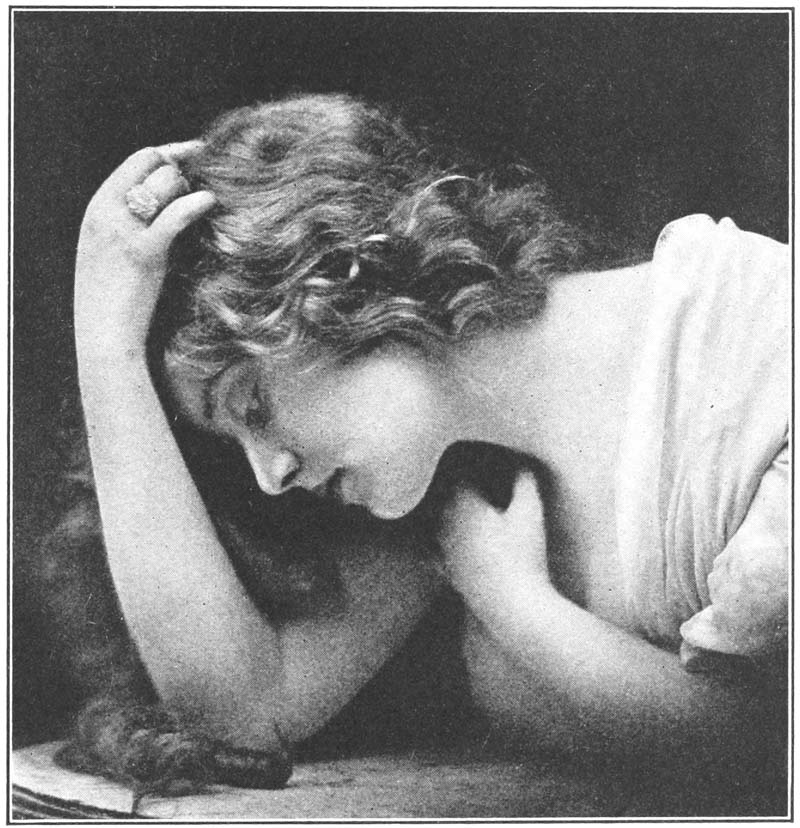
“There she sat, with her head bending low, thinking, thinking, thinking.”
And she had never known how she had lost it—unless it was because she had grown to care too much and to show it too plainly. Could it be that? Had he cared only for the uncertainty—the love of pursuit? And without that—being sure of his conquest—his interest had died?
Ah, no—no! passionately she denied that. The man she loved was bigger, finer than that! He could not have stooped to a merely cheap desire for conquest. If he had ceased to love her, it was some fault of hers, some failing, some lack within herself of which she was unconscious.
She had spent long hours of torturing self-analysis trying to find where she had failed—what it was that in the beginning he might have thought she possessed—and then found she did not. So great was her love for him that she felt she could almost make of herself what he wanted—just by the sheer strength of willing it!
If only she could be with him enough! If she could but have the chance to make him care for her again! He used to come almost every day—and now—now, sometimes many days would pass.
She knew it was a mistake to ask him when he was coming—to try to name any particular time. He seemed to resent that now. If only she could let him go without a word! But the thought of the long, silent absence that might follow always terrified her. Once, for two weeks, she had not heard from him; and the memory of those two weeks’ suffering always weakened her to the point of trying to make some definite engagement to escape the sickening uncertainty of the days to come.
Oh, she was so helpless—so pitiably helpless! Wholly dependent on him for her happiness, yet powerless to break down this wall he was placing between them!
She slowly arose and threw herself into a chair. There she sat, with her head bending low, thinking, thinking, thinking.
Then gradually there stole over her a sense of quiet—almost of peace. It was partly the relaxation that comes after any emotional strain, and partly because of a faint hope, a belief that sometimes came to her and that comforted her above everything else—the thought that because she gave of her best—because the love she gave was a great and good love—some time he could come to know, to understand, and to love her again, if only for her unfaltering love of him!
If she could but wait long enough—patiently enough—in the end the love she so wanted might be hers!

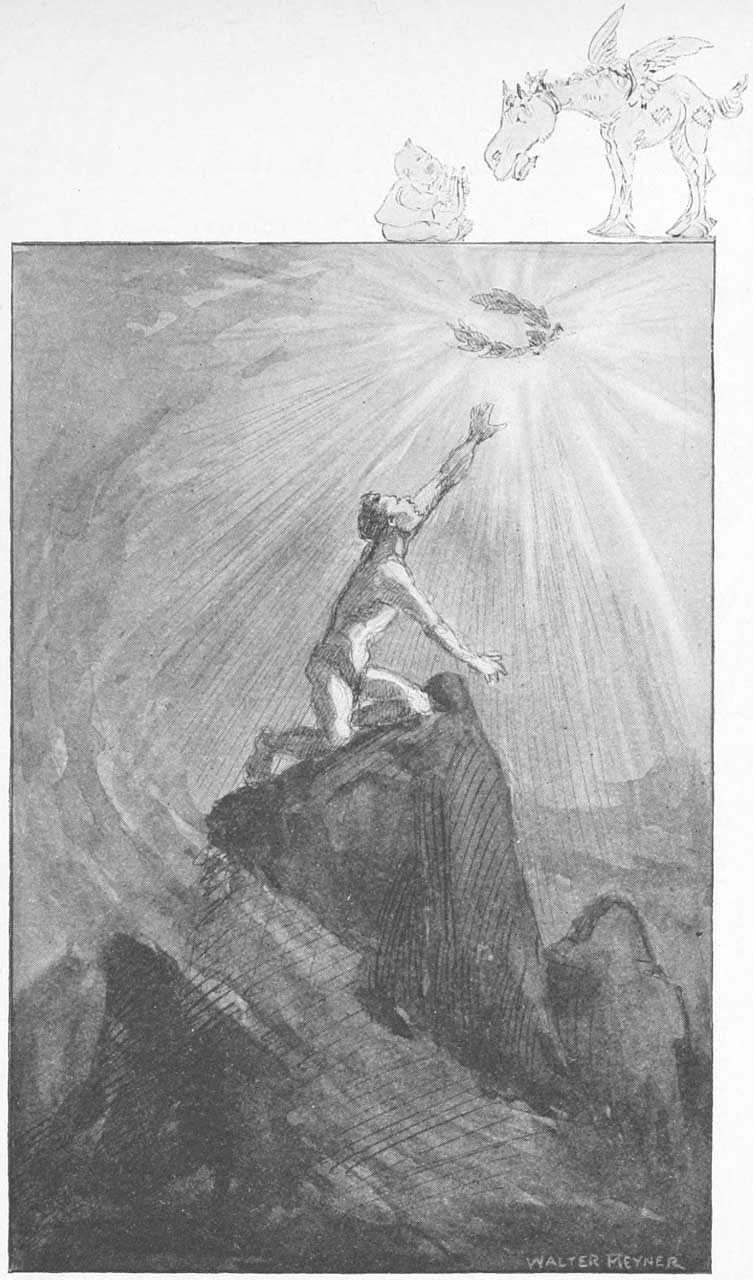


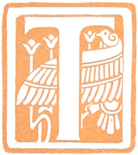
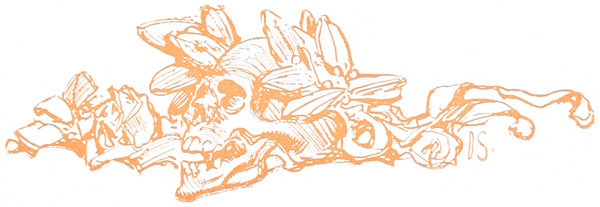



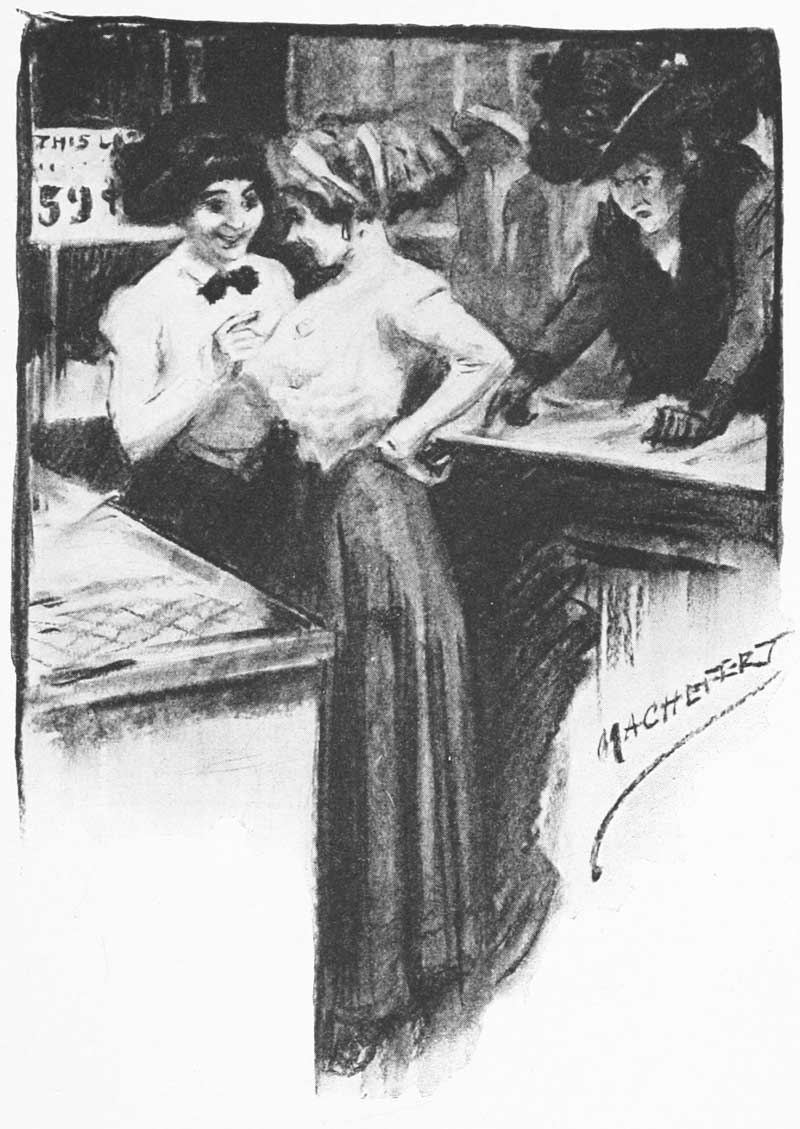

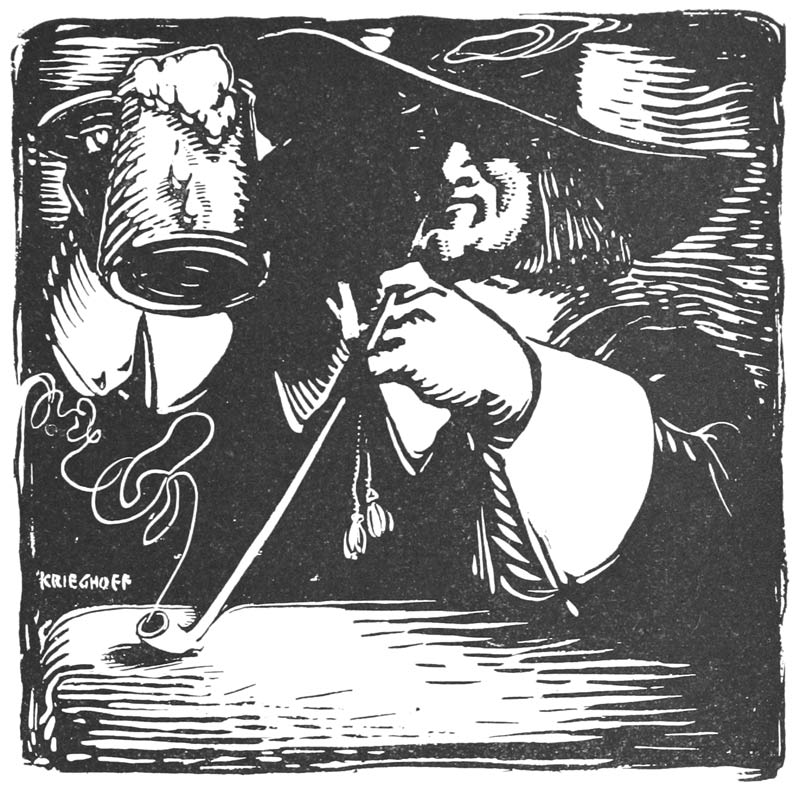



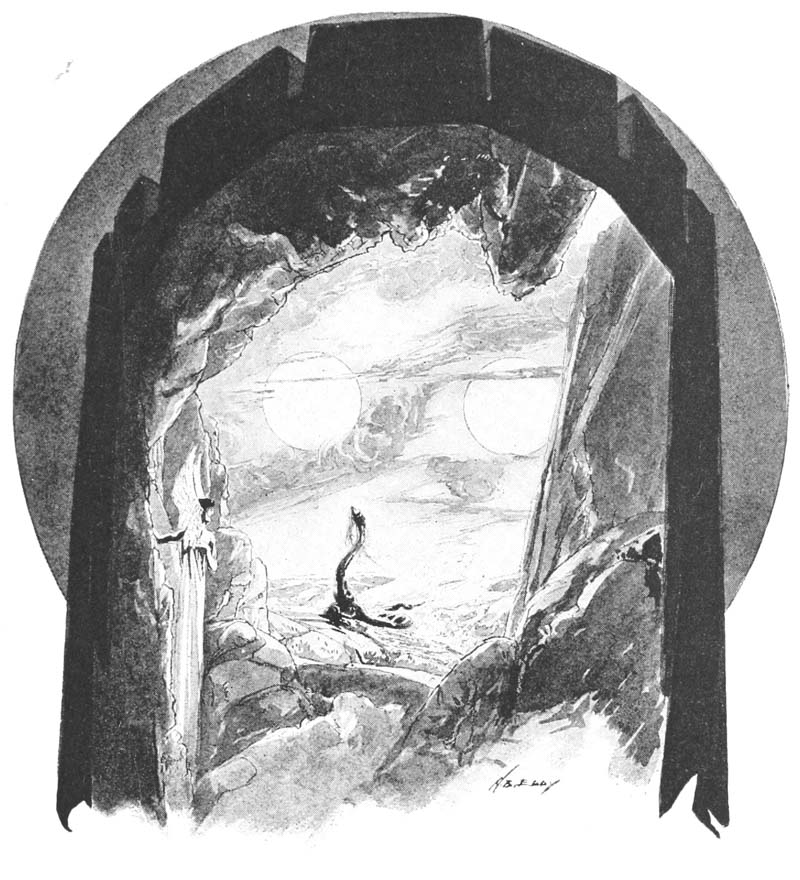
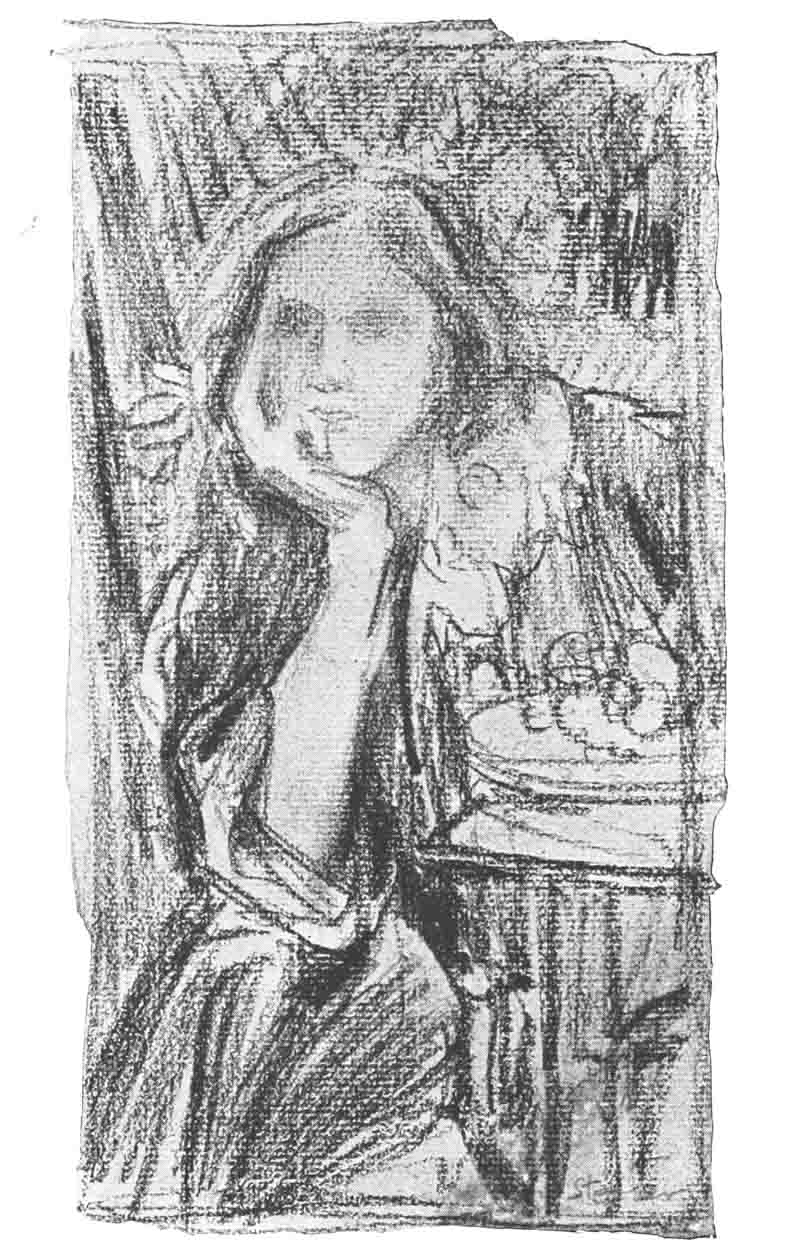
Drawn by Albert Sterner.

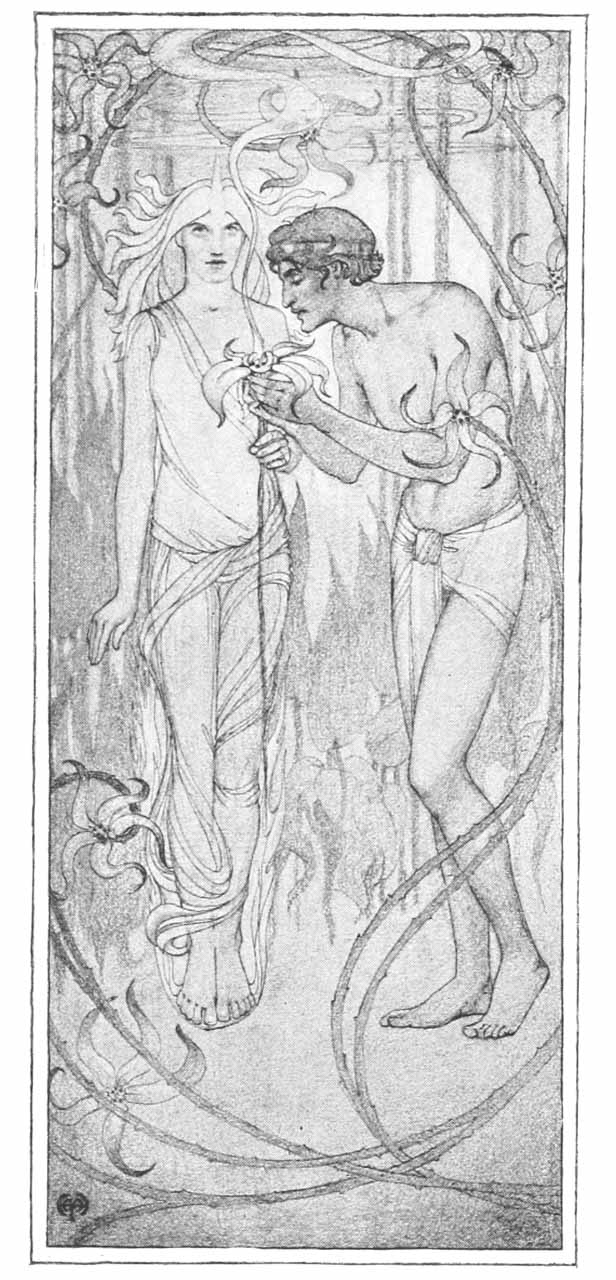
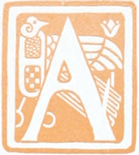 VERY long time ago, when the Heavens
were quite new and the Earth was still in
the Golden Age, a strange event occurred—quite
unheard of even in those early
times.
VERY long time ago, when the Heavens
were quite new and the Earth was still in
the Golden Age, a strange event occurred—quite
unheard of even in those early
times.
The Sun, vigorous and lusty, had rubbed his blinking eyes and hurried away to the west. The boy-child, Twilight, his chubby hands still clutching after the last red rays left behind by the Sun, winked his sleepy eyes, as, protestingly, he was pushed along in his crimson cart by Old Sandman. Close behind came his three sisters, the Evening Shadows, in their long, trailing, gray robes. A hush fell upon the Heavens. From far below came the hum of the Crickets and the low murmur of the Katydids, having their final good-night gossip, but in the Sky all was still until the Moonlady came softly creeping along, her silver mantle enfolding her slight form, her long silken hair caught by the Evening Breeze, who followed close in her wake. At her appearance there arose from the Earth songs of gladness and hymns of praise. Lovers looked up at her enraptured, poets sang of her, and even the brute creation sent Heavenward their low murmur of joy at her being. Silently she smiled down upon them all as she passed on her way.
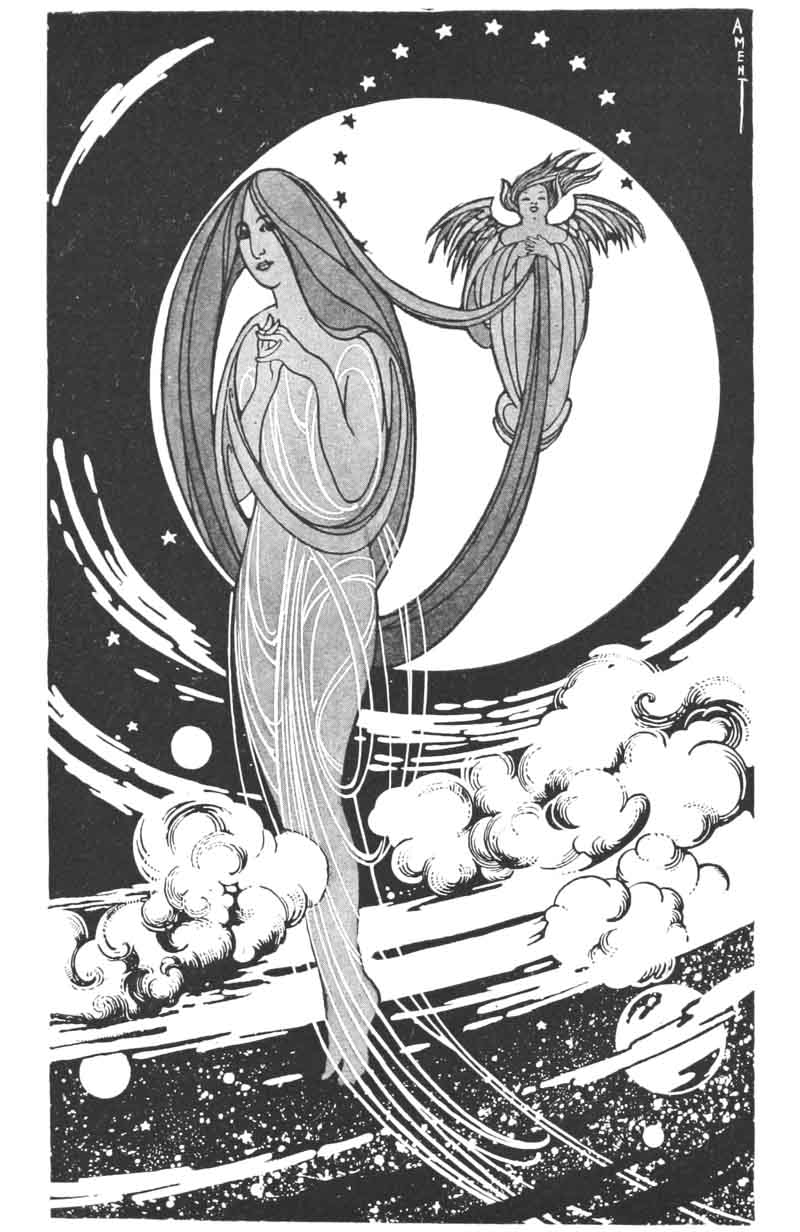
“The Moonlady stole softly across the sky.”
Then a strange thing happened. Black clouds skurried here and there across the Heavens, and low mutterings were heard. The Stars had revolted!
Venus, her cold beauty marred by a frown of discontent, was the center of a murmuring group, to whom she spoke in words of passion:
“Let us take a firm stand. Why should we go on shining, shining through countless ages? We are not appreciated. We never receive any praise. There are so many of us and our light is so feeble, who cares whether we shine or not? The Moon comes along and takes away our glory; let her do all the work then. Why should we waste our light trying to outshine the Moon and the Sun? Unless we can be as brilliant as they and receive as much praise, let us not shine at all.”
Each Star blinked a sullen assent, and gradually each little light flickered and went out. The Dog Star barked and the Great Bears growled—the low mutterings became a loud rumble, and the Heavens for once were dark, save for a faint light that still gleamed away off in the north. Seeing the feeble light still shining, all the Stars rushed to it, surrounding the feeble Star that persisted in shining, and jeered at her folly.
“Put out your light, you foolish one. Do you hope to vie with the Sun or the Moon with that feeble flame of yours? What use can you be in this great space of darkness?”
“I do not know,” replied the Star, faintly, “but I can
go on shining and do my best, though my light is small
and goes but a little way. I do not envy the Moonlady
her glory. Is it not a great thing that she can shine so
radiantly upon the Earth and make so many happy? And
if there were no Sun, what would the poor little Flowers
do, and the Birds and the Beasts? My little light cannot
do much good, but I can do my best to keep it bright, and
if it reaches to Earth but faintly I shall be grateful. I
had rather light one soul onward and upward than to have
a choir of Angels sing my praises; I had rather one
person should be glad he had seen my rays, than to be
crowned with a crown of brilliant jewels and never have
made anyone glad; I had rather one tearful soul should
look to me and find comfort in my steady light than to
have a million people bow down to me in worship of my
beauty; I had rather one soul should be truly sorry when
my light goes out than that a thousand should praise me for
my brilliancy and not know when I ceased to shine; I
had rather a baby’s face looked up at me and smiled and
called my name than to be praised in a poet’s song and
know he was paid so much a line for it; I had rather
send one faint ray of hope into some troubled heart than
to light the World’s Great White Way; I had rather
shine on for ages unnoticed than to shine with borrowed
light and be afraid of being blown out; I had
rather ”
But the little Star found herself all alone, and as she looked
about her she saw that each Star was in its accustomed
place, and that each light was more brilliant than it had
ever been before. Even the dark clouds had vanished, and
a little child looked up at the Sky from her bedroom window
and said, “O, mother dear, see how beautiful are the
stars to-night! They are God’s jewels, set in His Crown
of Glory, aren’t they? If we are very good shall we be
beautiful stars some day and shine for Him?”
”
But the little Star found herself all alone, and as she looked
about her she saw that each Star was in its accustomed
place, and that each light was more brilliant than it had
ever been before. Even the dark clouds had vanished, and
a little child looked up at the Sky from her bedroom window
and said, “O, mother dear, see how beautiful are the
stars to-night! They are God’s jewels, set in His Crown
of Glory, aren’t they? If we are very good shall we be
beautiful stars some day and shine for Him?”
And the Stars looked down and smiled Good-night. And the brightest of all the Stars were the Pleiades.

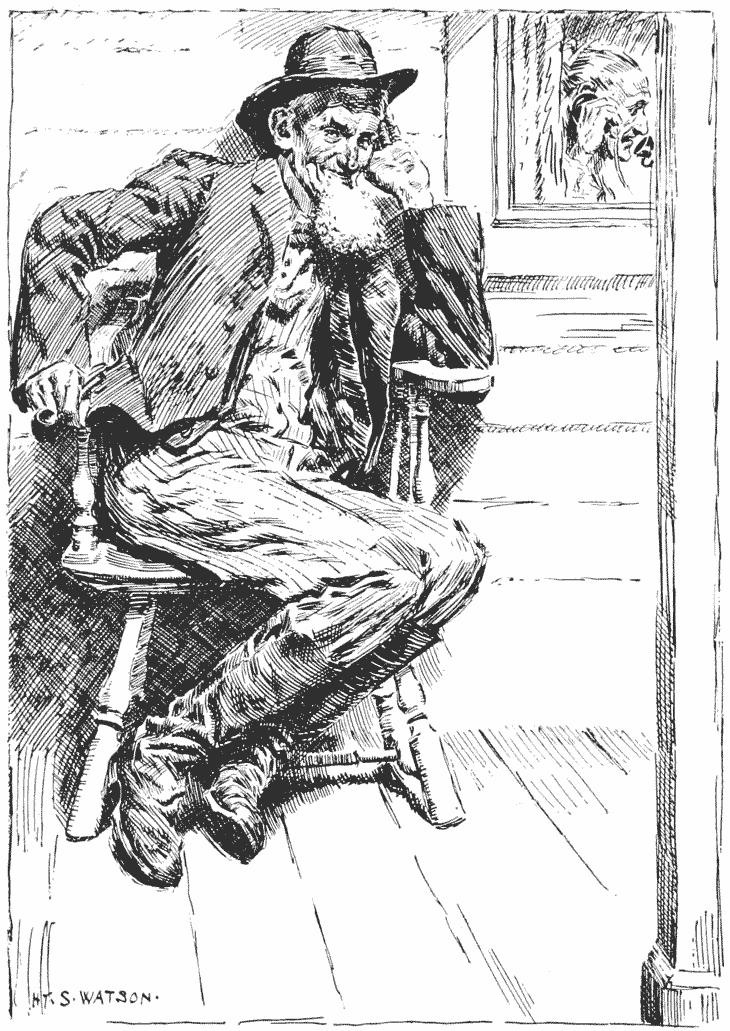

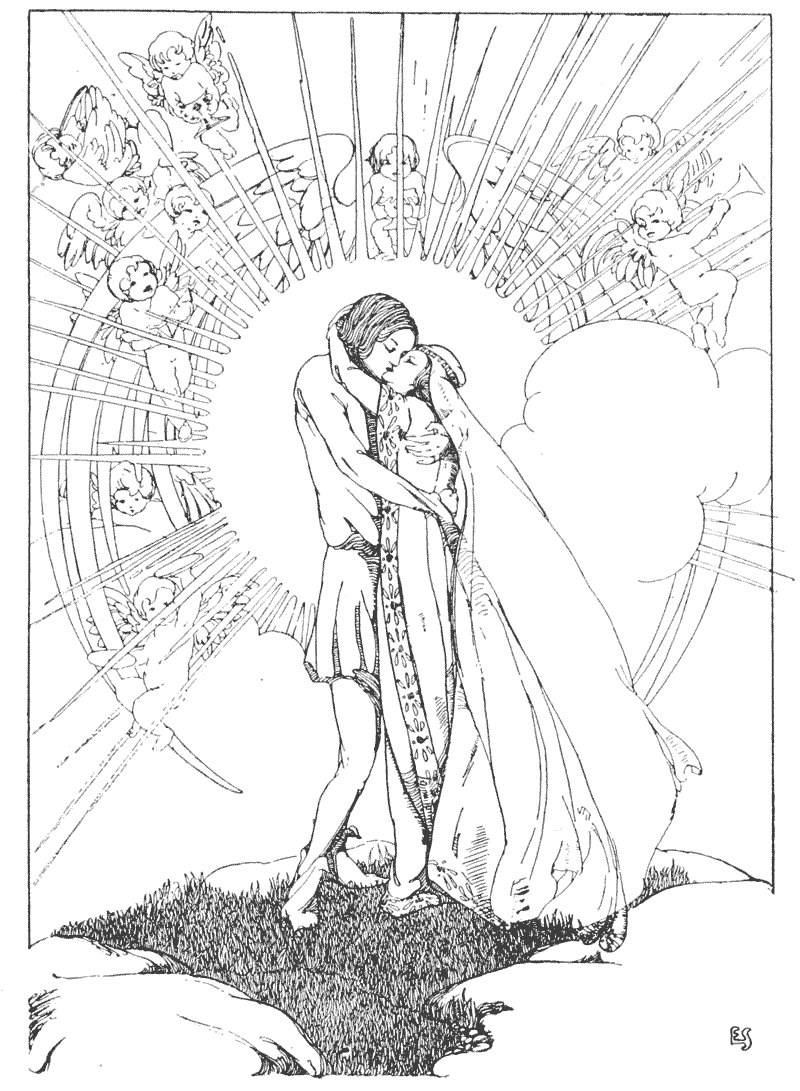

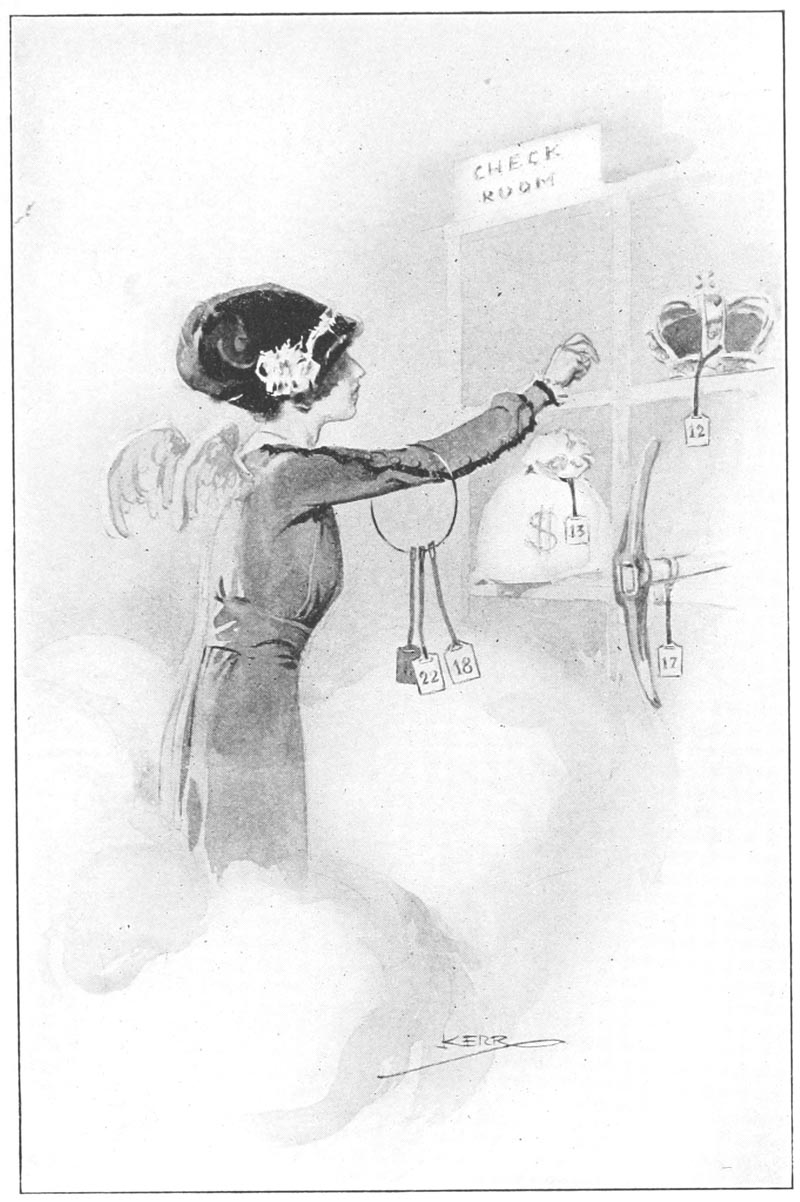


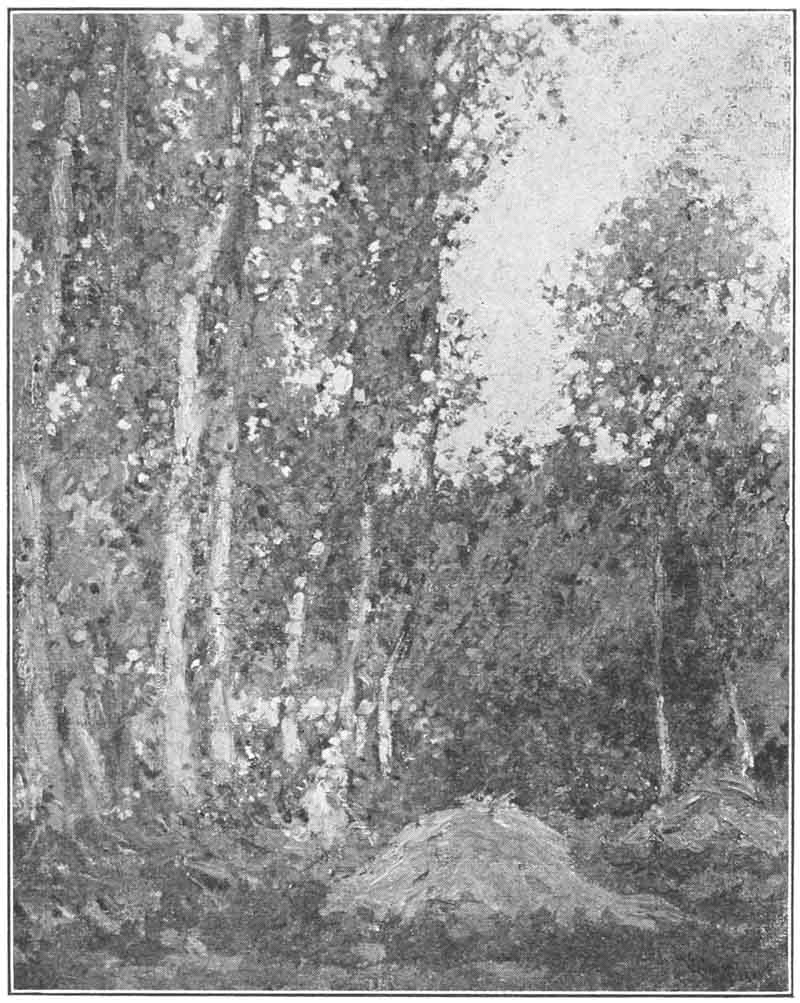



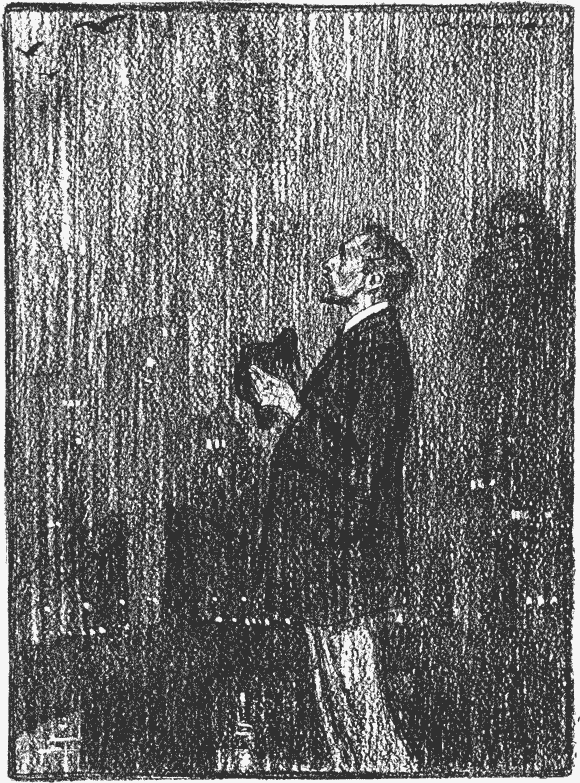


 HE Boarderland is a drear domain bounded
on the north by top-floor bedrooms, lying
above the frost-line, because the steam register
always gets discouraged and quits one
story below. It is bounded on the south
by basement dining-rooms, where it is night
six months a year and just before daylight the rest of the
time; on the east by an entrance hall agreeably perfumed
with the combined aroma of kerosene, mother-of-onion,
veteran linoleum and the stuffing in the red-plush sofa, and
on the west by a parlor nine feet wide and thirty-two feet
long, with one window in it and a doctor’s sign in the window.
The doctor’s private office lies just back of the parlor,
so the parlor smells mildewed when the connecting door is
closed and iodoformed when it’s open.
HE Boarderland is a drear domain bounded
on the north by top-floor bedrooms, lying
above the frost-line, because the steam register
always gets discouraged and quits one
story below. It is bounded on the south
by basement dining-rooms, where it is night
six months a year and just before daylight the rest of the
time; on the east by an entrance hall agreeably perfumed
with the combined aroma of kerosene, mother-of-onion,
veteran linoleum and the stuffing in the red-plush sofa, and
on the west by a parlor nine feet wide and thirty-two feet
long, with one window in it and a doctor’s sign in the window.
The doctor’s private office lies just back of the parlor,
so the parlor smells mildewed when the connecting door is
closed and iodoformed when it’s open.
Boarders, as the natives of this land are commonly called, are never allowed in the parlor except once, that occasion being when they first apply for board. Thereafter they entertain their company on the front stoop in the summer and on the telephone in the winter. Winter company is the more expensive.
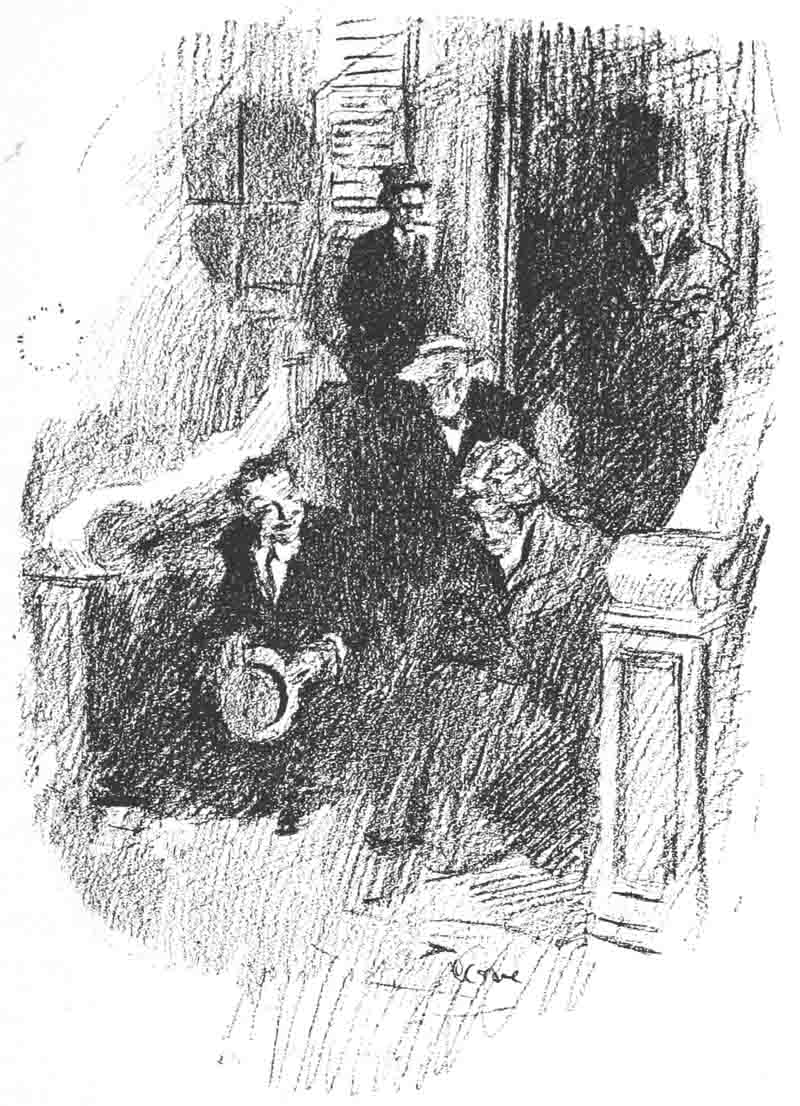
“Thereafter they entertain their company on the front stoop.”
The ruling classes of Hallroumania are known as Landladies and may be classed generally into the following subdivisions: Landladies who belong to Old Southern Families and formerly rode in Their Own Carriages, but suffered Heavy Financial Reverses through the Cruel War brought on By Your Mister Lincoln; Landladies who never married and don’t regret it; Landladies who did marry and frequently regret it; Landladies who have no use for husbands, and Landladies who have husbands and use them to take the dog out.
The inhabitants are indeed a weird race, including unrecognized geniuses, earnest hopers, chronic grouches, back files and innocent bystanders; also single gentlemen who are believed to have had what is known as A PAST, and who are suspected of leading the dissipated life because they come in of an evening with the odor of rum and Business Men’s Lunch on their breath; also young women of undoubted dramatic power, who won the first prize for elocution at the Rome Centre School of Expression and came on two winters ago to put Julia Marlowe out of the business, but are being kept back temporarily owing to a jealous compact on the part of the theatrical syndicate; also other young women who think they are entitled to bird-like notes because they had the thrush once, and were sent here at heavy expense by fond parents who imagine New York as a place full of talented voice-plumbers who know how to weld Nellie Melba pipes on a Ruth Ann larynx; also single ladies who spend part of the time drying handkerchiefs on the window-panes and doing light laundry work in a toothbrush-mug, and the rest of the time making life brighter and sweeter for a pug dog with the asthma.
Also dashing gents connected with leading brokerage offices downtown, who wear priceless marquise rings on the little finger of the right hand, and go secretly away at night owing for two weeks; also persons of both sexes who have been misunderstood by the world and crave A Little Sympathy—that is all; also ladies who are constantly on the verge of moving to a perfectly delightful place up in Ninety-third Street because a fur-bearing foreigner has opened a Pants-Pressery next door and the neighborhood is rapidly losing its tone; also, just plain boarders.
A boarder is often likened to a worm. And this is a proper comparison if it is a tapeworm that is meant, because a tapeworm always knows in advance what it is going to have for dinner, and so does a boarder. For instance, he knows that on Monday night he will have a New England boiled dinner that tastes like the family wash on Friday night, one gill and part of the dorsal fin of a boiled fish, and on Sunday evening that nourishing repast known as cold Sunday-night tea.
This cold tea is probably the most noted of the established institutions of Hallroumania, being constituted as follows: A dank cold platter, veneered at rare intervals with specimens of the Old Red Corned-Beef Period of Geology, cut to the generous thickness of gold leaf; a peculiar variety of potato-salad, in a free state of perspiration and garnished at intervals with slices of pickled beets, like a few red chips strewn on the kitty; four small squares of petrified pastry (not suitable for food, but could be given to hardy children to cut their teeth on); a prune-floater, bloated up and nine days drowned in its own juice; a cup of ostensible tea.
The common recreations of The Boarderland are rushing the washstand-duck in a dress-suit case; wondering how the other boarders can afford the clothes they wear; progressive knocking and raising scandals from the slip. The prevalent disease is Furnished Rheumatism, brought on by living in a single-breasted apartment, and is marked by a cramped, choking sensation, the symptoms being almost identical with those of Harlem Flatulency.
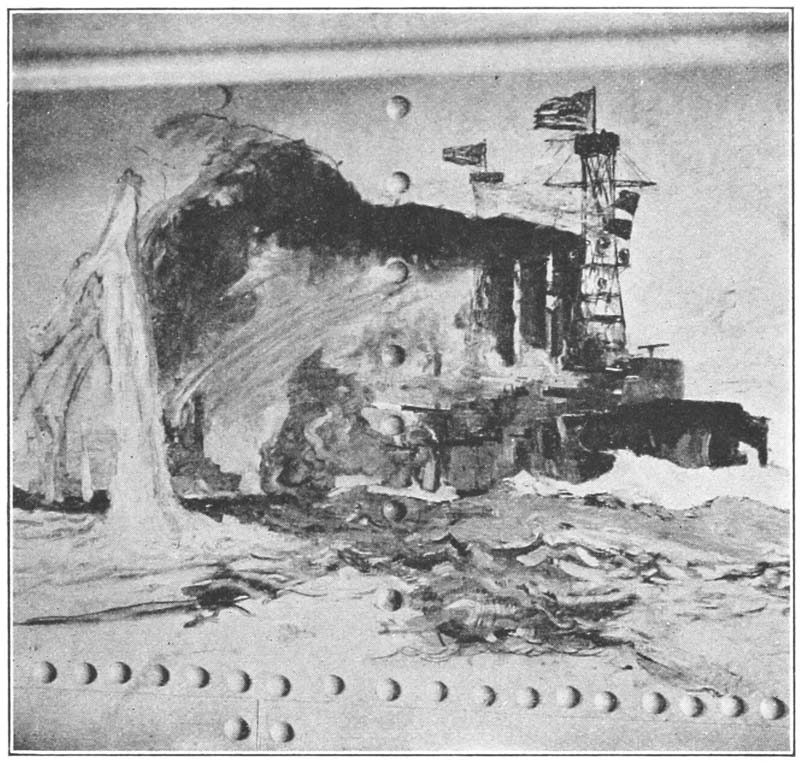
Drawn by Henry Reuterdahl.

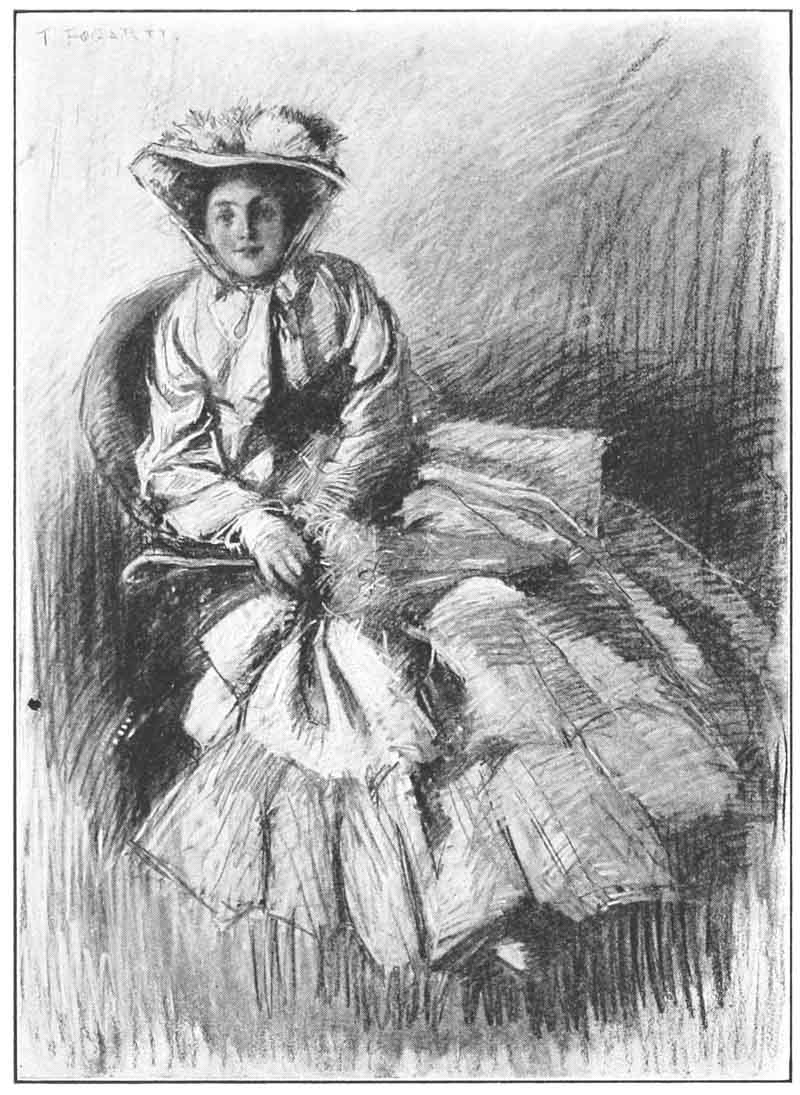
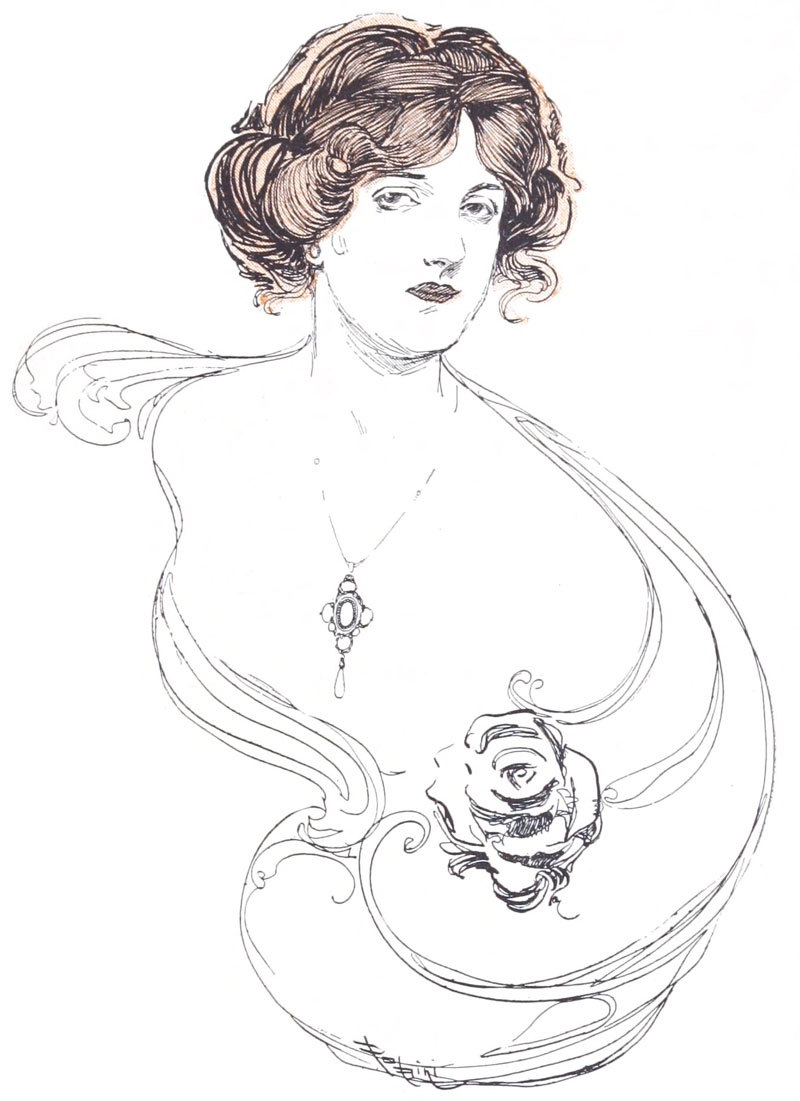
Drawn by Alexander Popini.

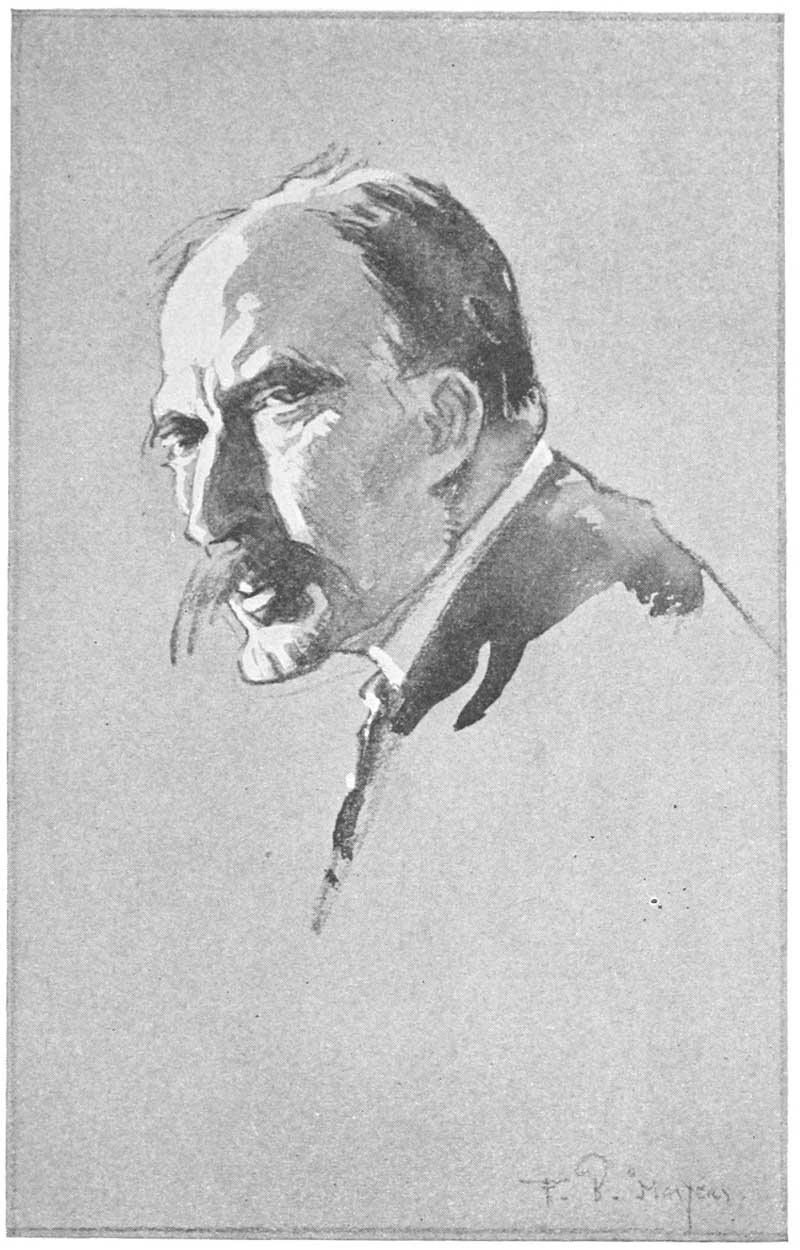
Drawn by F. B. Masters.

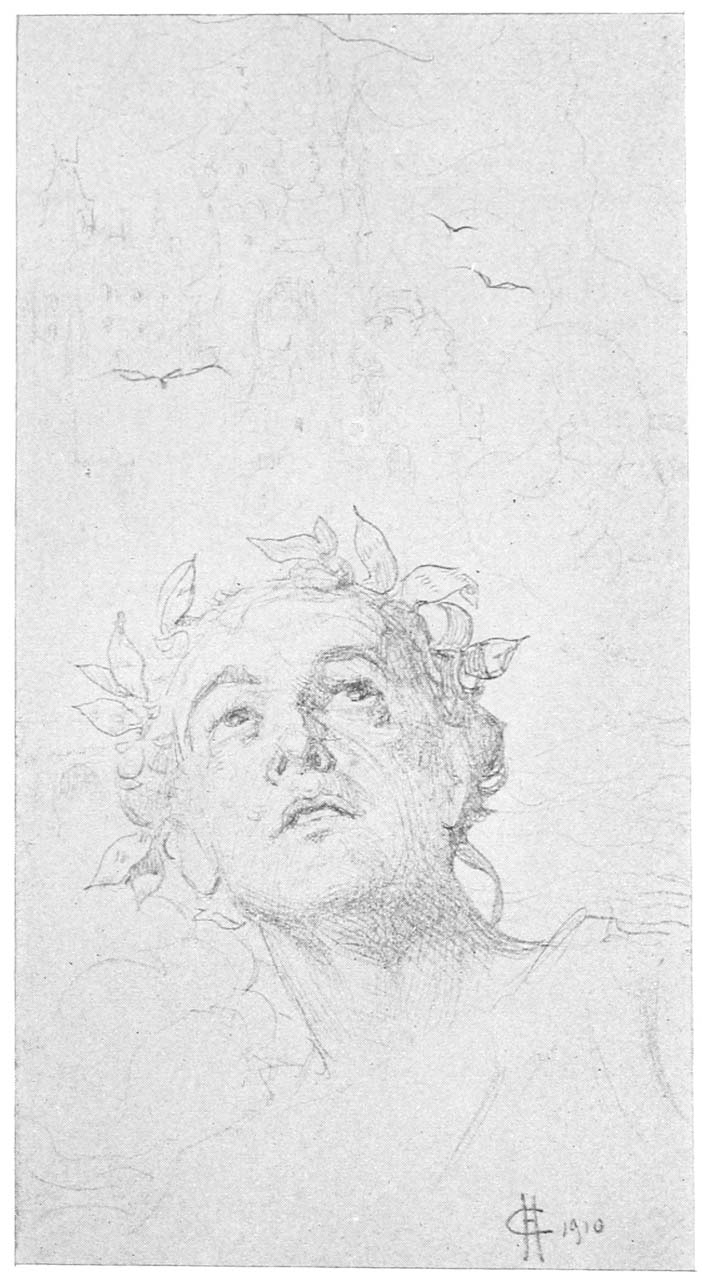
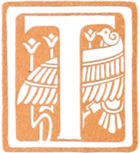
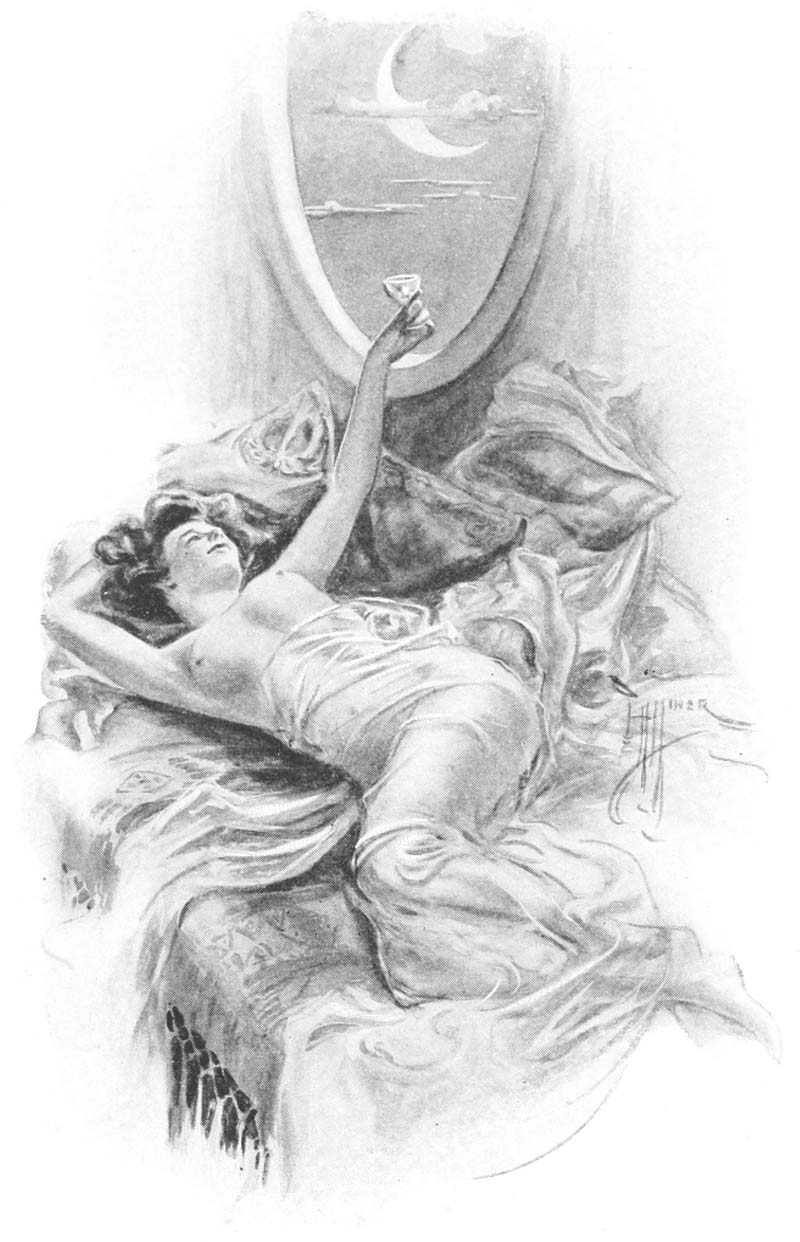
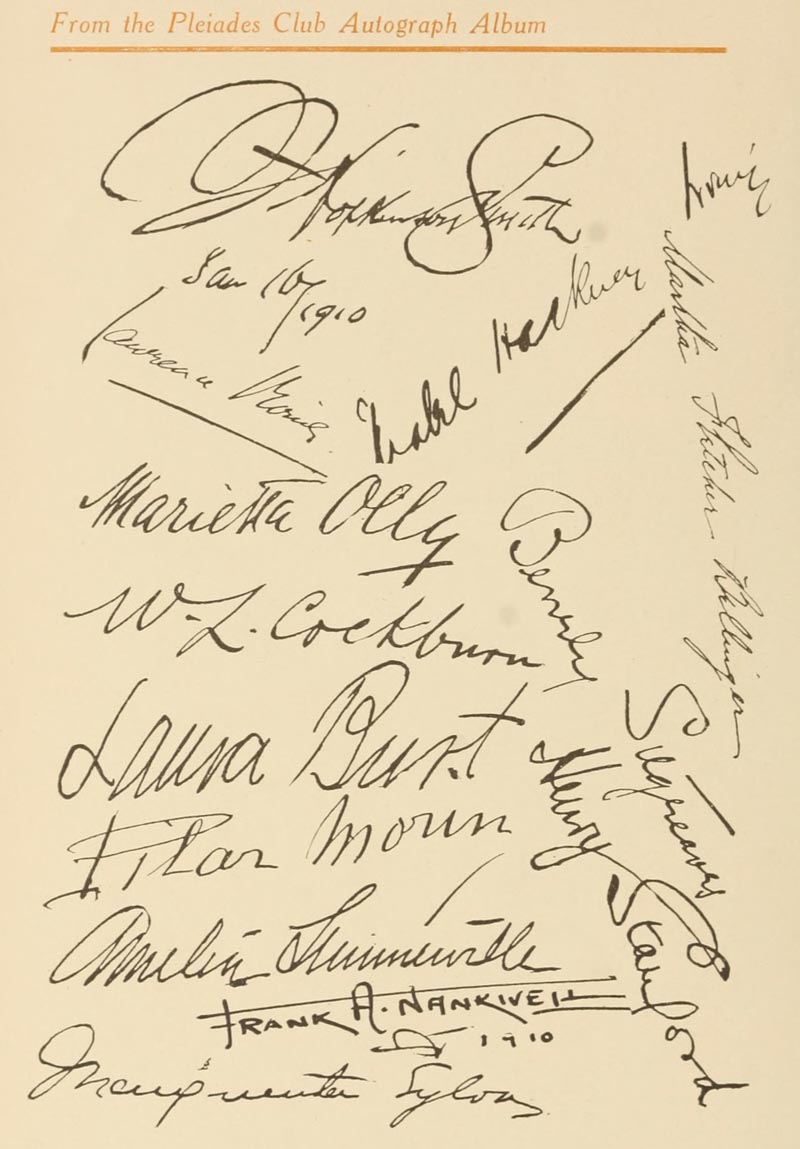
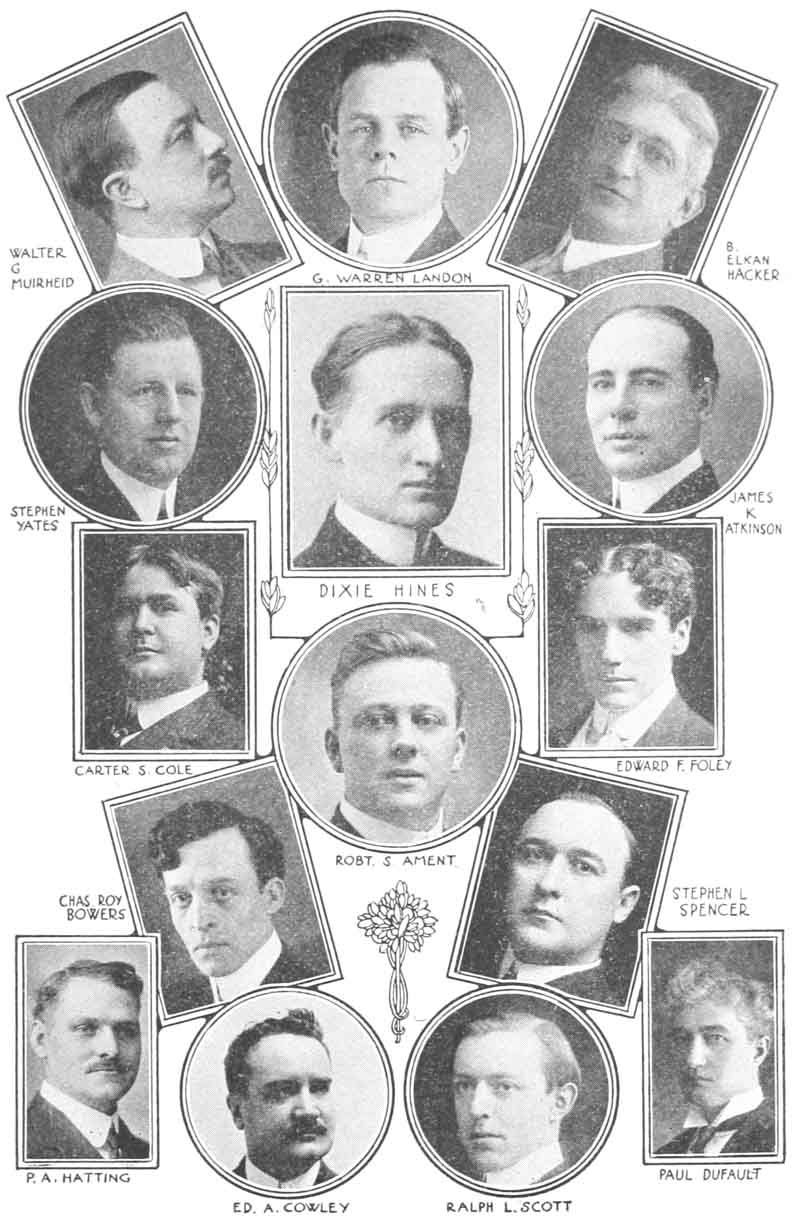
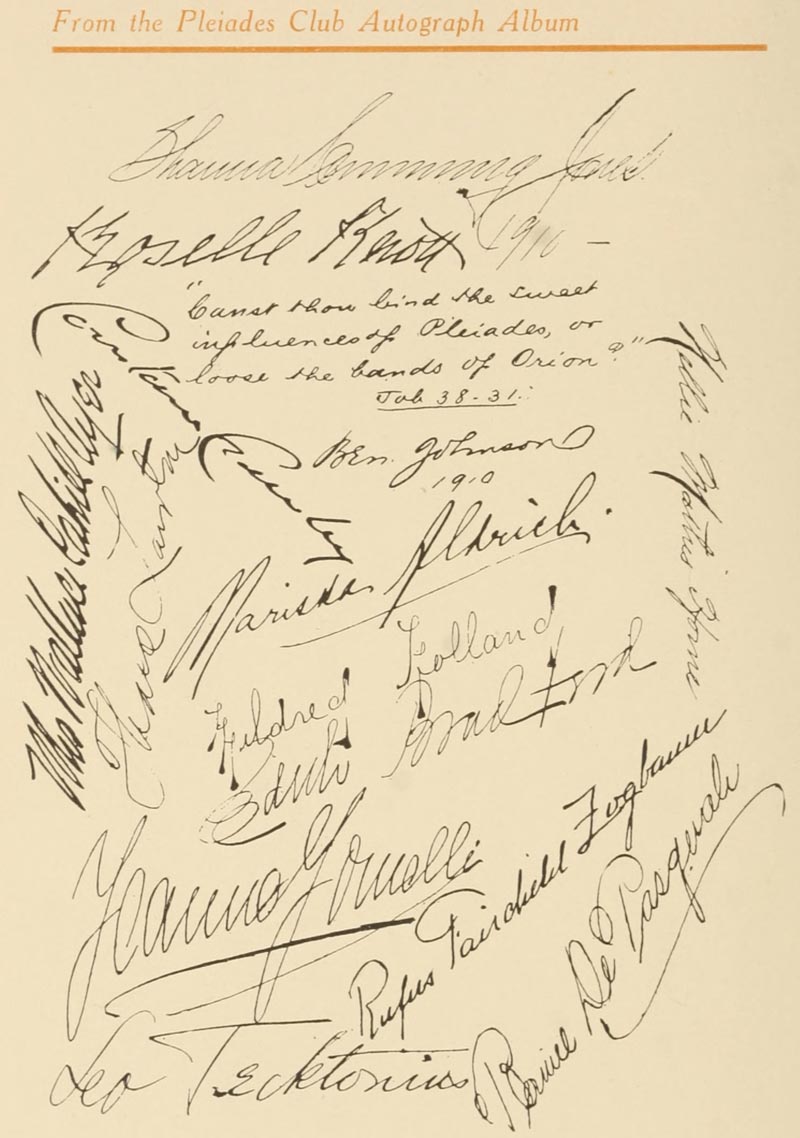
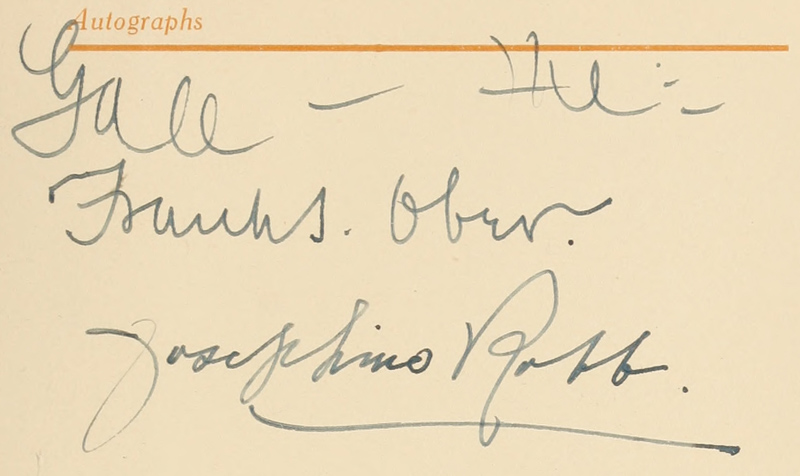

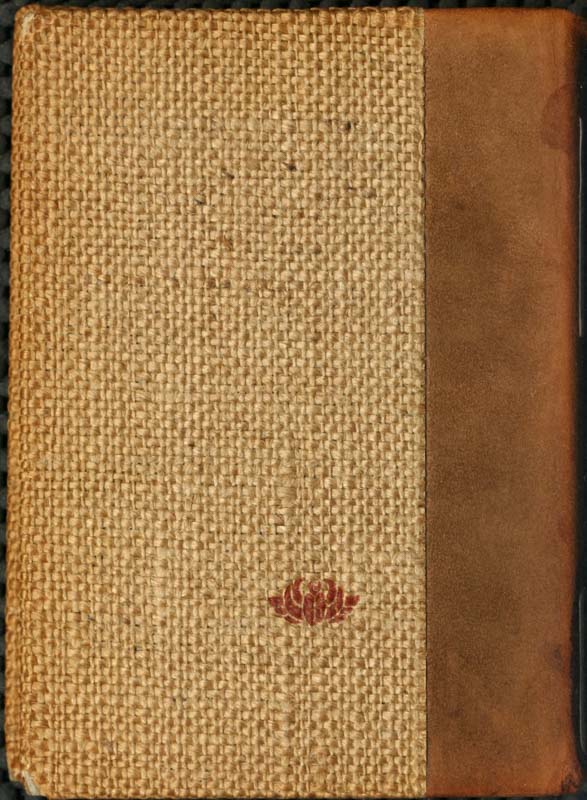
Original spelling and grammar have been generally retained, with some exceptions noted below. The transcriber produced the cover image by slightly altering the original, and hereby assigns it to the public domain. Illustrations, other than drop-caps, have been moved from within paragraphs of text to nearby locations between paragraphs. For this purpose, I have treated stanzas of poetry like paragraphs of text. Original page images are available from archive.org—search for “pleiadesclubyear00plei”.
The List of Contributors mentions a W. Krieghof, but the poem A TOAST was said to be illustrated by Krieghoff, and that is also the signature on the illustration. The Tale of the Store Girl was illustrated by “Adrian Machefert”, but the List of Contributors mentions an “Adrien Machefert”. A Song was written by “Philip Verrill Mighels”, but the List of Contributors has it “Phillip Verrill Mighels”. The Old, Old Prayer was supposedly written by “John W. Postgate”, but the List of Contributors mentions only “J. W. Postgare”.
In the sixth paragraph of Waiting!, a new right double quotation mark was inserted after ‘But I’ll phone you some time during the week.’.
At the bottom of the poem At the Pleiades, by Maurice V. Samuels, there was in our copy of the book what appears to be a hand-written signature of Maurice Samuels. This is retained as an image in this transcription, although we don’t know whether it was present in only one or all printed copies of this book. The image was edited slightly, to remove traces of text from the last line of the poem where the signature and poem overlapped. What appears to be the signature of Francesca di Maria Spaulding, following her poem, The Wanderer, is also retained.
Near the end of the book there were five pages dedicated to Autographs of club members, two of which were blank, followed by a blank page, followed by a sort of collophon with an emblem and the name of the publishing company, followed by more blank pages. The autographs are retained, although we don’t know whether they were present in one or all printed copies of the book. The blank pages have been ignored in this transcription.
End of the Project Gutenberg EBook of Pleiades Club Year Book 1910, by
The N.Y. Pleiades Club
*** END OF THIS PROJECT GUTENBERG EBOOK PLEIADES CLUB YEAR BOOK 1910 ***
***** This file should be named 56423-h.htm or 56423-h.zip *****
This and all associated files of various formats will be found in:
http://www.gutenberg.org/5/6/4/2/56423/
Produced by MFR, RichardW, and the Online Distributed
Proofreading Team at http://www.pgdp.net (This file was
produced from images generously made available by The
Internet Archive)
Updated editions will replace the previous one--the old editions will
be renamed.
Creating the works from print editions not protected by U.S. copyright
law means that no one owns a United States copyright in these works,
so the Foundation (and you!) can copy and distribute it in the United
States without permission and without paying copyright
royalties. Special rules, set forth in the General Terms of Use part
of this license, apply to copying and distributing Project
Gutenberg-tm electronic works to protect the PROJECT GUTENBERG-tm
concept and trademark. Project Gutenberg is a registered trademark,
and may not be used if you charge for the eBooks, unless you receive
specific permission. If you do not charge anything for copies of this
eBook, complying with the rules is very easy. You may use this eBook
for nearly any purpose such as creation of derivative works, reports,
performances and research. They may be modified and printed and given
away--you may do practically ANYTHING in the United States with eBooks
not protected by U.S. copyright law. Redistribution is subject to the
trademark license, especially commercial redistribution.
START: FULL LICENSE
THE FULL PROJECT GUTENBERG LICENSE
PLEASE READ THIS BEFORE YOU DISTRIBUTE OR USE THIS WORK
To protect the Project Gutenberg-tm mission of promoting the free
distribution of electronic works, by using or distributing this work
(or any other work associated in any way with the phrase "Project
Gutenberg"), you agree to comply with all the terms of the Full
Project Gutenberg-tm License available with this file or online at
www.gutenberg.org/license.
Section 1. General Terms of Use and Redistributing Project
Gutenberg-tm electronic works
1.A. By reading or using any part of this Project Gutenberg-tm
electronic work, you indicate that you have read, understand, agree to
and accept all the terms of this license and intellectual property
(trademark/copyright) agreement. If you do not agree to abide by all
the terms of this agreement, you must cease using and return or
destroy all copies of Project Gutenberg-tm electronic works in your
possession. If you paid a fee for obtaining a copy of or access to a
Project Gutenberg-tm electronic work and you do not agree to be bound
by the terms of this agreement, you may obtain a refund from the
person or entity to whom you paid the fee as set forth in paragraph
1.E.8.
1.B. "Project Gutenberg" is a registered trademark. It may only be
used on or associated in any way with an electronic work by people who
agree to be bound by the terms of this agreement. There are a few
things that you can do with most Project Gutenberg-tm electronic works
even without complying with the full terms of this agreement. See
paragraph 1.C below. There are a lot of things you can do with Project
Gutenberg-tm electronic works if you follow the terms of this
agreement and help preserve free future access to Project Gutenberg-tm
electronic works. See paragraph 1.E below.
1.C. The Project Gutenberg Literary Archive Foundation ("the
Foundation" or PGLAF), owns a compilation copyright in the collection
of Project Gutenberg-tm electronic works. Nearly all the individual
works in the collection are in the public domain in the United
States. If an individual work is unprotected by copyright law in the
United States and you are located in the United States, we do not
claim a right to prevent you from copying, distributing, performing,
displaying or creating derivative works based on the work as long as
all references to Project Gutenberg are removed. Of course, we hope
that you will support the Project Gutenberg-tm mission of promoting
free access to electronic works by freely sharing Project Gutenberg-tm
works in compliance with the terms of this agreement for keeping the
Project Gutenberg-tm name associated with the work. You can easily
comply with the terms of this agreement by keeping this work in the
same format with its attached full Project Gutenberg-tm License when
you share it without charge with others.
1.D. The copyright laws of the place where you are located also govern
what you can do with this work. Copyright laws in most countries are
in a constant state of change. If you are outside the United States,
check the laws of your country in addition to the terms of this
agreement before downloading, copying, displaying, performing,
distributing or creating derivative works based on this work or any
other Project Gutenberg-tm work. The Foundation makes no
representations concerning the copyright status of any work in any
country outside the United States.
1.E. Unless you have removed all references to Project Gutenberg:
1.E.1. The following sentence, with active links to, or other
immediate access to, the full Project Gutenberg-tm License must appear
prominently whenever any copy of a Project Gutenberg-tm work (any work
on which the phrase "Project Gutenberg" appears, or with which the
phrase "Project Gutenberg" is associated) is accessed, displayed,
performed, viewed, copied or distributed:
This eBook is for the use of anyone anywhere in the United States and
most other parts of the world at no cost and with almost no
restrictions whatsoever. You may copy it, give it away or re-use it
under the terms of the Project Gutenberg License included with this
eBook or online at www.gutenberg.org. If you are not located in the
United States, you'll have to check the laws of the country where you
are located before using this ebook.
1.E.2. If an individual Project Gutenberg-tm electronic work is
derived from texts not protected by U.S. copyright law (does not
contain a notice indicating that it is posted with permission of the
copyright holder), the work can be copied and distributed to anyone in
the United States without paying any fees or charges. If you are
redistributing or providing access to a work with the phrase "Project
Gutenberg" associated with or appearing on the work, you must comply
either with the requirements of paragraphs 1.E.1 through 1.E.7 or
obtain permission for the use of the work and the Project Gutenberg-tm
trademark as set forth in paragraphs 1.E.8 or 1.E.9.
1.E.3. If an individual Project Gutenberg-tm electronic work is posted
with the permission of the copyright holder, your use and distribution
must comply with both paragraphs 1.E.1 through 1.E.7 and any
additional terms imposed by the copyright holder. Additional terms
will be linked to the Project Gutenberg-tm License for all works
posted with the permission of the copyright holder found at the
beginning of this work.
1.E.4. Do not unlink or detach or remove the full Project Gutenberg-tm
License terms from this work, or any files containing a part of this
work or any other work associated with Project Gutenberg-tm.
1.E.5. Do not copy, display, perform, distribute or redistribute this
electronic work, or any part of this electronic work, without
prominently displaying the sentence set forth in paragraph 1.E.1 with
active links or immediate access to the full terms of the Project
Gutenberg-tm License.
1.E.6. You may convert to and distribute this work in any binary,
compressed, marked up, nonproprietary or proprietary form, including
any word processing or hypertext form. However, if you provide access
to or distribute copies of a Project Gutenberg-tm work in a format
other than "Plain Vanilla ASCII" or other format used in the official
version posted on the official Project Gutenberg-tm web site
(www.gutenberg.org), you must, at no additional cost, fee or expense
to the user, provide a copy, a means of exporting a copy, or a means
of obtaining a copy upon request, of the work in its original "Plain
Vanilla ASCII" or other form. Any alternate format must include the
full Project Gutenberg-tm License as specified in paragraph 1.E.1.
1.E.7. Do not charge a fee for access to, viewing, displaying,
performing, copying or distributing any Project Gutenberg-tm works
unless you comply with paragraph 1.E.8 or 1.E.9.
1.E.8. You may charge a reasonable fee for copies of or providing
access to or distributing Project Gutenberg-tm electronic works
provided that
* You pay a royalty fee of 20% of the gross profits you derive from
the use of Project Gutenberg-tm works calculated using the method
you already use to calculate your applicable taxes. The fee is owed
to the owner of the Project Gutenberg-tm trademark, but he has
agreed to donate royalties under this paragraph to the Project
Gutenberg Literary Archive Foundation. Royalty payments must be paid
within 60 days following each date on which you prepare (or are
legally required to prepare) your periodic tax returns. Royalty
payments should be clearly marked as such and sent to the Project
Gutenberg Literary Archive Foundation at the address specified in
Section 4, "Information about donations to the Project Gutenberg
Literary Archive Foundation."
* You provide a full refund of any money paid by a user who notifies
you in writing (or by e-mail) within 30 days of receipt that s/he
does not agree to the terms of the full Project Gutenberg-tm
License. You must require such a user to return or destroy all
copies of the works possessed in a physical medium and discontinue
all use of and all access to other copies of Project Gutenberg-tm
works.
* You provide, in accordance with paragraph 1.F.3, a full refund of
any money paid for a work or a replacement copy, if a defect in the
electronic work is discovered and reported to you within 90 days of
receipt of the work.
* You comply with all other terms of this agreement for free
distribution of Project Gutenberg-tm works.
1.E.9. If you wish to charge a fee or distribute a Project
Gutenberg-tm electronic work or group of works on different terms than
are set forth in this agreement, you must obtain permission in writing
from both the Project Gutenberg Literary Archive Foundation and The
Project Gutenberg Trademark LLC, the owner of the Project Gutenberg-tm
trademark. Contact the Foundation as set forth in Section 3 below.
1.F.
1.F.1. Project Gutenberg volunteers and employees expend considerable
effort to identify, do copyright research on, transcribe and proofread
works not protected by U.S. copyright law in creating the Project
Gutenberg-tm collection. Despite these efforts, Project Gutenberg-tm
electronic works, and the medium on which they may be stored, may
contain "Defects," such as, but not limited to, incomplete, inaccurate
or corrupt data, transcription errors, a copyright or other
intellectual property infringement, a defective or damaged disk or
other medium, a computer virus, or computer codes that damage or
cannot be read by your equipment.
1.F.2. LIMITED WARRANTY, DISCLAIMER OF DAMAGES - Except for the "Right
of Replacement or Refund" described in paragraph 1.F.3, the Project
Gutenberg Literary Archive Foundation, the owner of the Project
Gutenberg-tm trademark, and any other party distributing a Project
Gutenberg-tm electronic work under this agreement, disclaim all
liability to you for damages, costs and expenses, including legal
fees. YOU AGREE THAT YOU HAVE NO REMEDIES FOR NEGLIGENCE, STRICT
LIABILITY, BREACH OF WARRANTY OR BREACH OF CONTRACT EXCEPT THOSE
PROVIDED IN PARAGRAPH 1.F.3. YOU AGREE THAT THE FOUNDATION, THE
TRADEMARK OWNER, AND ANY DISTRIBUTOR UNDER THIS AGREEMENT WILL NOT BE
LIABLE TO YOU FOR ACTUAL, DIRECT, INDIRECT, CONSEQUENTIAL, PUNITIVE OR
INCIDENTAL DAMAGES EVEN IF YOU GIVE NOTICE OF THE POSSIBILITY OF SUCH
DAMAGE.
1.F.3. LIMITED RIGHT OF REPLACEMENT OR REFUND - If you discover a
defect in this electronic work within 90 days of receiving it, you can
receive a refund of the money (if any) you paid for it by sending a
written explanation to the person you received the work from. If you
received the work on a physical medium, you must return the medium
with your written explanation. The person or entity that provided you
with the defective work may elect to provide a replacement copy in
lieu of a refund. If you received the work electronically, the person
or entity providing it to you may choose to give you a second
opportunity to receive the work electronically in lieu of a refund. If
the second copy is also defective, you may demand a refund in writing
without further opportunities to fix the problem.
1.F.4. Except for the limited right of replacement or refund set forth
in paragraph 1.F.3, this work is provided to you 'AS-IS', WITH NO
OTHER WARRANTIES OF ANY KIND, EXPRESS OR IMPLIED, INCLUDING BUT NOT
LIMITED TO WARRANTIES OF MERCHANTABILITY OR FITNESS FOR ANY PURPOSE.
1.F.5. Some states do not allow disclaimers of certain implied
warranties or the exclusion or limitation of certain types of
damages. If any disclaimer or limitation set forth in this agreement
violates the law of the state applicable to this agreement, the
agreement shall be interpreted to make the maximum disclaimer or
limitation permitted by the applicable state law. The invalidity or
unenforceability of any provision of this agreement shall not void the
remaining provisions.
1.F.6. INDEMNITY - You agree to indemnify and hold the Foundation, the
trademark owner, any agent or employee of the Foundation, anyone
providing copies of Project Gutenberg-tm electronic works in
accordance with this agreement, and any volunteers associated with the
production, promotion and distribution of Project Gutenberg-tm
electronic works, harmless from all liability, costs and expenses,
including legal fees, that arise directly or indirectly from any of
the following which you do or cause to occur: (a) distribution of this
or any Project Gutenberg-tm work, (b) alteration, modification, or
additions or deletions to any Project Gutenberg-tm work, and (c) any
Defect you cause.
Section 2. Information about the Mission of Project Gutenberg-tm
Project Gutenberg-tm is synonymous with the free distribution of
electronic works in formats readable by the widest variety of
computers including obsolete, old, middle-aged and new computers. It
exists because of the efforts of hundreds of volunteers and donations
from people in all walks of life.
Volunteers and financial support to provide volunteers with the
assistance they need are critical to reaching Project Gutenberg-tm's
goals and ensuring that the Project Gutenberg-tm collection will
remain freely available for generations to come. In 2001, the Project
Gutenberg Literary Archive Foundation was created to provide a secure
and permanent future for Project Gutenberg-tm and future
generations. To learn more about the Project Gutenberg Literary
Archive Foundation and how your efforts and donations can help, see
Sections 3 and 4 and the Foundation information page at
www.gutenberg.org Section 3. Information about the Project Gutenberg
Literary Archive Foundation
The Project Gutenberg Literary Archive Foundation is a non profit
501(c)(3) educational corporation organized under the laws of the
state of Mississippi and granted tax exempt status by the Internal
Revenue Service. The Foundation's EIN or federal tax identification
number is 64-6221541. Contributions to the Project Gutenberg Literary
Archive Foundation are tax deductible to the full extent permitted by
U.S. federal laws and your state's laws.
The Foundation's principal office is in Fairbanks, Alaska, with the
mailing address: PO Box 750175, Fairbanks, AK 99775, but its
volunteers and employees are scattered throughout numerous
locations. Its business office is located at 809 North 1500 West, Salt
Lake City, UT 84116, (801) 596-1887. Email contact links and up to
date contact information can be found at the Foundation's web site and
official page at www.gutenberg.org/contact
For additional contact information:
Dr. Gregory B. Newby
Chief Executive and Director
gbnewby@pglaf.org
Section 4. Information about Donations to the Project Gutenberg
Literary Archive Foundation
Project Gutenberg-tm depends upon and cannot survive without wide
spread public support and donations to carry out its mission of
increasing the number of public domain and licensed works that can be
freely distributed in machine readable form accessible by the widest
array of equipment including outdated equipment. Many small donations
($1 to $5,000) are particularly important to maintaining tax exempt
status with the IRS.
The Foundation is committed to complying with the laws regulating
charities and charitable donations in all 50 states of the United
States. Compliance requirements are not uniform and it takes a
considerable effort, much paperwork and many fees to meet and keep up
with these requirements. We do not solicit donations in locations
where we have not received written confirmation of compliance. To SEND
DONATIONS or determine the status of compliance for any particular
state visit www.gutenberg.org/donate
While we cannot and do not solicit contributions from states where we
have not met the solicitation requirements, we know of no prohibition
against accepting unsolicited donations from donors in such states who
approach us with offers to donate.
International donations are gratefully accepted, but we cannot make
any statements concerning tax treatment of donations received from
outside the United States. U.S. laws alone swamp our small staff.
Please check the Project Gutenberg Web pages for current donation
methods and addresses. Donations are accepted in a number of other
ways including checks, online payments and credit card donations. To
donate, please visit: www.gutenberg.org/donate
Section 5. General Information About Project Gutenberg-tm electronic works.
Professor Michael S. Hart was the originator of the Project
Gutenberg-tm concept of a library of electronic works that could be
freely shared with anyone. For forty years, he produced and
distributed Project Gutenberg-tm eBooks with only a loose network of
volunteer support.
Project Gutenberg-tm eBooks are often created from several printed
editions, all of which are confirmed as not protected by copyright in
the U.S. unless a copyright notice is included. Thus, we do not
necessarily keep eBooks in compliance with any particular paper
edition.
Most people start at our Web site which has the main PG search
facility: www.gutenberg.org
This Web site includes information about Project Gutenberg-tm,
including how to make donations to the Project Gutenberg Literary
Archive Foundation, how to help produce our new eBooks, and how to
subscribe to our email newsletter to hear about new eBooks.